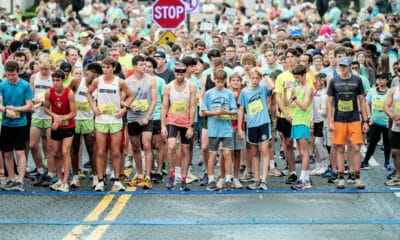Community
Rabbi Yossi Lerman, talking about Chabad of Gwinnett, Community Outreach and his New Book [Podcast]
Published
5 years agoon
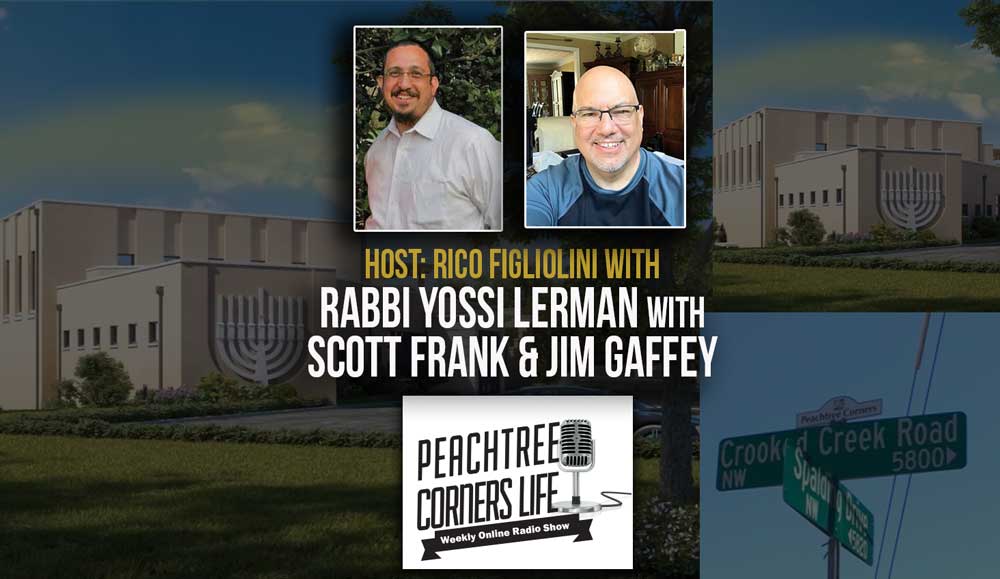
Rabbi Yossi Lerman and co-author of “Less Stress, More Joy,” with co-author Scott Frank and Jim Gaffey, President of the Men’s Club Outreach of Mary Our Queen Catholic Church, all joined Rico Figliolini to discuss Chabad of Gwinnett, their philosophy, outreach, their planned Chabad Enrichment Center in Peachtree Corners.
Recorded at Atlanta Tech Park, in City of Peachtree Corners, Georgia
Resources:
Chabad Website: www.ChabadOfGwinnett.org
Rabbi Yossi’s Phone: (678) 595-0196
Mary Our Queen Website: https://maryourqueen.com
Jim Gaffey’s Phone: (770) 364-6359 Buy their book:
Podcast Transcript
Rico: [00:00:30] Hi everyone. This is Rico Figliolini host of Peachtree Corners Life and publisher of Peachtree Corners Magazine. I appreciate you guys joining us and we have a special guest today. But before we get to that, I just want to acknowledge our sponsor here at Atlanta Tech Park in the City of Peachtree Corners, we’re in that podcast studio, Atlanta Tech Park is an accelerator, huge place. Lots of startups and mid size companies ready to be pushed out of the nest. And they’re doing a lot of high tech stuff here. This actually sits on Curiosity Lab at Peachtree Corners, which is a stretch road about a mile and a half. That is an autonomous vehicle track that’s alive, living track. The mobile, IOT type technology companies can come here and experiment in life environment to see how their equipment, software and such works. So just a great opportunity to be in a great place in the city of Peachtree Corners. Now to get to my guest today, my guest today is Rabbi Yossi Lehrman. Thank you, Rabbi for coming. Rabbi Yossi Lierman is head of the Chabad of Gwinnett. And, we’re going to be discussing a little bit about that, the philosophy and the outreach. Scott Frank also is chairman of the building committee for Chabad of Gwinnett. They’re creating a Chabad enrichment center. So it’s, it’s a piece that’s going to be, like many of our faith institutions providing a lot of good outreach and, and good places here in Peachtree Corners. And Jim Gaffey, who is president of the men’s club at the Mary Our Queen Church. Jim, thanks for being here.
Jim: [00:02:05] Thank you Rico.
Rico: [00:02:06] Good community support from local church?
Jim: [00:02:08] That’s correct.
Rico: [00:02:09] Excellent. Scott, thank you for being here as well. So Rabbi, tell me a little bit about, tell me a little bit about yourself? Where, where you come from and who you are.
Rabbi Yossi: [00:02:18] Well, sure. My best topic to talk about myself because I should know myself. I consider myself a very lucky person. I am married. We’ve been married for 32 years to my dear wife Esther, and we’ve been blessed with seven children. And, by now all of my kids are out of the house. They’ve established, many of them married and established their life, and in school and in a direction of life. And so I am a person that, every day I wake up and I ask myself a simple question, what can I do to enrich someone’s life? I might use a little philosophical question here because we’re adults and we can think about this. And if we can answer this philosophical question, I think we can answer the most important question of life. Okay, here’s the question. A zebra.
Rico: [00:03:38] A zebra?
Rabbi Yossi: [00:03:39] A zebra. Is a zebra white with black stripes? Or is the zebra black with white stripes? Okay. That’s the question that I’d like to pose here today, and of course that could
be expanded. Am I a good person sometimes doing wrong things? Or am I a bad person sometimes doing good things?
Rico: [00:04:17] I haven’t heard it that way before. Interesting.
Rabbi Yossi: [00:04:19] Or, we continue to expand. Am I a physical human being sometimes having a soulful spiritual experience? Or in fact am I a soul, a spiritual being in a physical body having a physical experience?
Rico: [00:04:49] Wow. No, that’s getting deep now. That is deep though. I like that.
Rabbi Yossi: [00:04:59] My point is, of course, is that we, we we’re always looking for the positives. And that’s something that as an organization and as a movement, our movement is Chabad. Chabad is an international educational and cultural humanitarian organization. Chabad is more or less throughout the entire world. We have over 5,000 offices throughout the world.
Rico: [00:05:34] Now so the people understand cause it’s, lots of Baptists, a lot of Catholic. Like so Jewish people, I grew up in Brooklyn, you know, it was just, they were my best friends and everything. Is Chabad a separate sect of the Jewish community. How is that, how would that relate to that?
Rabbi Yossi: [00:05:52] Good question. Chabad is mainstream Judaism. And Chabad has utilized a secret formula. And this secret formula is known as Kabbalah. Kabbalah is available and Kabbalah is a school of thought that does delve deeper into the realities. Like the black stripes or the white stripes, or am I good or bad in essence, or am I a soul or am I a body? So that is Kabbalistic thinking. And, so Chabad has utilized lots of the Kabbalistic teachings. For one purpose, and that is to enrich people’s lives. And so, our teachers, our Chabad teachers in our generation, I’m a follower of Rabbi Menachem M. Schneerson. To many he’s known as the Rebbe. Probably one of the greatest dynamic teachers and leaders of Jewish world in our century. He is the one motivating, inspiring all of his followers, including many of his Rabbis around the world. And the message is one of let’s bring light. And if you will take a look. I’ll show you what I’m thinking about. When you ask people what kind of symbol, when they think of Judaism, what comes to mind in an image, in a physical form? Let me ask you that question. What kind of?
Rico: [00:07:53] The Star of David.
Rabbi Yossi: [00:07:54] The Star of David. Thank you very much. That’s the Israeli flag. But most people don’t realize is that there’s actually no biblical reference or sources to the Star of David.
Rico: [00:08:07] Really? I never knew that.
Rabbi Yossi: [00:08:08] Yeah, so that’s another good question. Another topic is the Star of David. The Star of David is very Cabalistic. But mainstream Jewish symbols in fact, if you go to Israel, you’ll find this on the main building of the Congress, the Knesset, and that’s a candelabra. People know about Hanukkah. Hanukkah is the Menorah, the candelabra. We use the candelabra as our logo. Okay.
Rico: [00:08:44] And we’ll have that logo on our show notes. So this way listeners can see it too.
Rabbi Yossi: [00:08:48] And so our message is, is that, I’m not trying to convince anybody anything they don’t already know or they don’t already have. What we’re all about is to turn the lights on. Turn the lights on, allowing people to see for themselves. They’re going to discover on their own what’s going on around them. What’s a good decision. What’s not a very good decision. What’s healthy and what’s not healthy. And that light that I’m talking about comes from the Torah. That’s of course the Bible. We consider that to be the most sacred, divine study an object that we have on planet earth.
Rico: [00:09:37] So Torah, like the Bible, like for gentiles, I guess. So that would be the same sort of, or not in comparison.
Rabbi Yossi: [00:09:47] Right. We have one Bible.
Rico: [00:09:50] So, we’ve talked a little bit about the philosophy about Chabad, and I, and I don’t want to neglect that out of that philosophy. You guys, you both have co-authored a book, so I’ll, I’ll show this up here. “Less Stress, More Joy.” So Scott Frank and, and Yossi here, Rabbi, co-authored this book because they came out of that philosophy of, of harmony, of peace, of outreach. So tell us, give us a minute or two on this, on the book? Why and what, what, what is it for?
Rabbi Yossi: [00:10:27] We, we actually, I, Scott and I came about this, from our own personal life and our own personal experience, as a member of Chabad joy was always the ultimate experience. If you’re not joyful, then you’re really not experiencing life. And we are very strong into clear your mind and heart from all negative emotions. And that’s what we teach. Chabod is a very big game. Education, the word Chabad is a Hebrew word, and we’ll just say that it means knowledge. So we’re very much into how to turn the lights on. Information, knowledge.
Rico: [00:11:29] Would you say the Kabbalah also informed the book a little bit? That whole?
Rabbi Yossi: [00:11:32] Yes. The answer is yes. For coming from, my contribution to the book, it came directly out of the studies of the Torah in Kabbalah and Hasidut.
Rico: [00:11:45] How long have, Scott, how long have you been involved with, with Rabbi Yossi, with Chabad of Gwinnett, with this part of the faith, if you will?
Scott: [00:11:54] Yeah, it goes back, I think it goes back to 2012 is when we first met. And, and to be honest with you, I had never met an Orthodox Rabbi before. And, I actually went to a Rosh Hashanah dinner and, shook his hand and I thought that would probably be the last time I ever spoke to him. It’s interesting. He, he followed up with a phone call to me and said, would you mind having lunch? And, I’m one of those people, and this gets into the book, that believes like everything kind of happens for a reason. And anybody that asks me for lunch, I go to lunch with, or I’ll meet with them. So I’ve met with an Orthodox Rabbi for lunch. I thought he was asking for money. I thought he was going to try to maybe get me to join his Orthodoxy. I didn’t know what he wanted exactly, but I went with an open mind and a peaceful heart. And, we turned out I had more in common than we expected. At least I had expected. I’d never met someone who, 24/7 was giving his life and his family’s life to helping people. He very much was, caring about me. And, we, we, we connected. I think we connected in a way he didn’t expect either. But he, he comes out from Torah and Kabbalah. I come at it, I wasn’t raised very Jewish, and I come at it from self help books and from, you know, conferences and radio shows and podcasts. So, but we both had the same goal, which is, trying to live a joyful life. Trying to help people. And, and we actually started on a monthly lunch, which, over the last few years has now become a weekly meeting. And, and we realized that we could together help people in a way that we don’t know that anybody else has because we come at it from, from different places. And, together we have come up with this peace, harmony, joy approach to living a better life.
Rico: [00:13:47] That’s funny. I’m a, I think Jim can appreciate this. I’m a, I’m a former Catholic. Grew up Italian Catholic, Brooklyn. I mean, you can’t, unless you’re Irish, you can’t get further into the church, I guess. But then I moved South, began, became a Reagan Democrat, although that’s sort of gone by the wayside. Baptist born again Christian. But I was a non-practicing Catholic and I’m somewhat of a non-practicing Christian right now. So I see what you said before you’ve learned from self help books from, from, you know, going that route. So what was the biggest takeaway that you learned from the Rabbi doing this book? What’s the thing that you learned probably the best out of it? But what came to fruition from it?
Scott: [00:14:37] The biggest thing I learned was that. You know, on the outside, he looks like a Orthodox Rabbi. He almost looks unapproachable. I mean, he is such a, a man of God. And, and, and he’s such a spiritual person. And yet, on the inside, he’s just like all of us. He has feelings, he has experiences, and he is striving to have a better life, a wonderful life, just like all of us.
Rico: [00:15:08] Rabbi, what about you? You know, working with Scott on this book? Is there anything different that you, that was surprising that you learned?
Rabbi Yossi: [00:15:17] I was very surprised. It’s almost like saying, I know why I’m doing this, and for me it’s like a calling. And I associate that calling to God. But then I found this individual who didn’t seem like he was engaged in any religion. Yet, he’s just like me. Where he is, devoted 24/7 to the cause. All Scott wants to know is how can I make this world a better place? And I said, that’s, that’s what I want to do. And we’re both about the same age. And we realized.
If not now, when? So I was very inspired by that, and I felt that while I’m sometimes unapproachable and people expect things from me, but if Scott says it and he’ll share with them the same message, people are gonna listen. And so, that was the big aha moment. Plus, I think that we both took our system and we applied it in our, in our factory. Which means we actually had a laboratory and see how this works and the laboratory is the Jewish community in Gwinnett County, where we started giving classes, started giving workshops. I see my role as step one; Let’s peacefully relax. Let’s calm down. You can’t talk to somebody who is stressed out. Who is all over the place, who’s juggling 25 balls and on the phone, you can’t talk to somebody. That’s a person who is just not available. So I find my role, as, as helping people peacefully calm down, relax. Step one, peace.I’ve, I studied, and I want to mention that in the Bible it says in this week’s Torah. It says, the very first thing that God said to Moses, the very first words coming out of God to Moses, okay? Everybody wonders what did God say? He said Moses, take off your shoes. Take off your shoes? What, what, what advice is that? And I always read into that. These one of interpretations. Relax. This is, this is like, like your bedroom. You could take your shoes off here. You know, you can take off your, your armor, you can, you can relax. So I saw this happen in our community. I saw people coming and why are they coming? To relax. They’re coming as if they’re going to a shrink or they’re going to therapy. First step, peacefulness. Second step, bringing people together. Harmony. We do this on a daily basis, filling up a room with people, making sure that there’s peace in the sense of there is harmony, that there is respect for each other, appreciation for each other. And I do need to control that together with the peace and then the harmony. We reach joy. So, that’s the story here where we not just had the idea and how we strive for this, but we actually put this to the test and then came the book.
Rico: [00:19:24] So for those that would like to pick it up. It is less stress, more joy, and you can go to PeaceHarmonyJoy.org.
Scott: [00:19:31] Or Amazon.
Rico: [00:19:32] Or Amazon, right.
Scott: [00:19:33] And by the way, we’re in for $3 and 58 cents we’re no profit. That is the minimum that Amazon will sell a book for $3.58 you can have that book too.
Rico: [00:19:41] Excellent. So that’s where you would go for this, and you should visit actually ChabadGwinnett.org also find our a little bit more about Chabad Enrichment. So let’s talk a little bit about that. How long has Chabad of Gwinnett actually been? When was it founded? How long has it been around?
Rabbi Yossi: [00:19:56] Yeah. Chabad just celebrated 18 years in Peachtree Corners. Which is Peachtree Corners today, it was Norcross. So we moved out 18 years ago. And I remember the day we moved out because that was a very, very significant day in American history. The day Chabad of Gwinnett was born was 9/11. We were coming from such a dark place, a place of
fear, a place of hate, of uncertainty. I knew right away what my mission is. I figured if 11 people can cause so much panic into the world, well we can bring, we can find 11 people to bring more peacefulness into the world. And so Chabad was born 9/11, and significantly that is right in the high holiday season of our Jewish New Year. For me, the mission and the cause is so clear and so obvious. The numbers really speak for itself. Gwinnett County has a Jewish population of about 10,000 Jewish homes, I know that because I have the data. In fact, I’m probably the only one who has this data and nobody’s getting it because this comes from a place of trust. People trust me with their information, right? They know, the Jewish community knows, I’m there for them. And so it’s more than, Chabad is much more than a synagogue. That’s for the records. Chabad is more of an enrichment center and enrichment can apply to everyone, including Jews, including non-Jews, including all of those faith because our message is universal.
Rico: [00:22:22] It’s interesting because Gwinnett County is probably the most diverse county state of Georgia. So when I moved here myself in ‘95, I didn’t realize how diverse it was. Especially at Peachtree Corners or this area before originally called Norcross. Probably not as diverse as the rest of the County, but became more so as it went through more urbanized actually, and it’s going to get more urbanized. Do you see that changing also the way Chabad Enrichment Center will focus? I mean, this, this county is changing.
Rabbi Yossi: [00:22:58] It’s changing, and I think that it’s, it’s, it’s a healthy situation it’s a healthy condition where minorities should take care of themselves. Which means that if somebody needs something, they need a doctor. They need a reference for an attorney, they will turn to me and say, rabbi, who do you know? Because you’re going to go to somebody of your own ethnic or whatever background. So, we take care of each other and that’s why I consider ourselves the enrichment program and we are dedicated to enrich the quality of life, whether it’s material, emotional, physical, or mental. We cover it all. And the picture is there’s only one other synagogue in the entire Gwinnett County.
Rico: [00:24:01] Is it the one on the border? Beth Shalom? Or are you talking about another one?
Rabbi Yossi: [00:24:06] Beth Shalom is not in Gwinnett County. The other, the one English speaking synagogue is in Snellville Georgia and that’s Beth David. It’s a reform temple. I’ve been there a number of times because I would love to see them grow. In fact, I would love to see more synagogues in Gwinnett County. My, I’m sitting at a level where I want to see more, more activity in Gwinnett County. So we have 10,000 Jewish families and one synagogue. What’s wrong with that picture?
Rico: [00:24:40] Yeah, that’s hard to service, if you will, that, that population, right?
Rabbi Yossi: [00:24:45] So, we Chabad is, is the perfect match for this scenario. In other words, if you brought in a conservative temple, some Jews might say, I’m not conservative, or they might just say, I’m unaffiliated. Don’t you get it? I don’t want to be affiliated. That’s why I moved
out to Gwinnett County. Chabad represents too many. It’s for people to go to when you need help. Chabad has a very, very interesting, just an open mind of accepting everyone, appreciating everyone. And like I said earlier, it’s really about, I am always looking for what’s positive in you. I want to help you be the best you are. And so I’m, I’m a gold digger. What does that mean? I know there is gold here. We gotta dig, but we haven’t found it yet. No problem. Dig deeper. I know there’s good in every individual. I know there’s a soul in every individual. I know that there is a soul in every encounter and every experience. There’s good in everything. So, right now Chabad is it in Gwinnett County.
Rico: [00:26:16] Well that’s good. So I’m going to segue now into a quiet, strong man here. Jim Gaffey has been quiet, here and just listening in with us, but he’s been a supporter, right? You’ve been a bit of a supporter of?
Jim: [00:26:32] Yes, since I first found out about them through actually Scott Frank’s mother and I are friends.
Rico: [00:26:39] It’s a small world.
Jim: [00:26:44] And I was approached, by the way, Scott Frank’s mother introduced Scott to the Rabbi in a Rosh Hashanah meal. Inherently my background is very inclusive. Who grew up similar to you in a community in Brooklyn, at the border of Flappers and Crown Heights, and many of my friends came from a Chabad background. And when I first moved here in 1980 that was not what I found. It was almost a singular community of one background from one faith. However, we have over the last 30 years, built our own community, a Catholic community are represented here, and the Peachtree Corners area at Mary Our Queen Catholic church. So that was the basis of how I came to understand the Chabad and its attempts to grow. We’re here for full support of that growth. The men’s club, as you have been a speaker at the men’s club, we’ve had many different diverse backgrounds as speakers. And for us, this was a natural progression of our outreach in the community. Presently there are nine congregations around us. Why not the Chabad of Gwinnett?
Rico: [00:28:07] Sure.
Jim: [00:28:08] And so that’s the initial answer to your question. Why are we here? And what are we doing? Is to support them and welcomed them into our community.
Rico: [00:28:16] I totally appreciate that. Cause you know, like you growing up in New York, every, every other block was either a church or a synagogue. At least from where I came from in Brooklyn.
Rabbi Yossi: [00:28:29] Can I, can I interrupt for a moment? Because I think this, this, this should go public. The fact that we’re sitting here together and we’re talking about a Jewish
organization and Jim Gaffey is here and to support. This is messianic, this is, this is amazing. And, publicly on behalf of the Jewish community and the Jewish world, I want to say thank you.
Jim: [00:28:54] You’re welcome.
Rabbi Yossi: [00:28:55] And your, your, your, your commitment and devotion is so real. We, we, we feel it. We really appreciate it.
Jim: [00:29:03] Oh, you’re welcome.
Rico: [00:29:05] Jim has been a great supporter of so many different things, so I totally agree with that. And whether it’s from the church or anywhere in the community, he’s always been a connector. So Jim has always put me to someone or brought me in somewhere, and it’s an interesting bit of a journey. Every once in a while we’ll be not talking for months and then all of a sudden I get a text from Jim. By the way, did you know? And so always someone in there trying to help out. So I appreciate that. So I look forward to the next men’s meeting and I’ll ask you about that at the end of the show. Who’s up next, by the way? For the next era. I’d like to put that out. So we’ve talked a bit about the Chabad itself, about the Enrichment Center about the book, about the outreach. I want to talk a little bit about what’s going on now with the, the idea of creating another faith institution, if you will, building a structure here in Peachtree Corners. I mean, we have like, like you said, we have nine in, right? Baptist, Protestant, Presbyterian, a variety. There’s no reason there should not be a Chabad Gwinnett Enrichment center in this area as well. And you guys own a piece of land that’s on Spalding drive. Just so that people are familiar where, where it is, it’s sort of a triangle-ish piece that is across from village park. And I was there this morning to meet some people. And it’s down the road from up the road depending on how you look at it from Peachtree Elementary. So not a great corner, but a, a corner that can be adjusted if need be, but you own a piece of land there. And actually another piece that came, came to fruition that married up with it now almost. And that’s where you’re looking to do the enrichment center. Am I?
Rabbi Yossi: [00:30:55] Yes. Yes, thank you. So, it was clear, it was clear to us from the get go that a facility was necessary. A physical structure that has the right space and the amenities of an enrichment center. That could include a library. That could include a kitchen to help feed people, naturally a sanctuary, a place to have classes. So back in 2006, we’re doing the, the search, we’re looking around, we’re looking around. We always knew that, that Norcross is going to be our base. As I keep talking about Gwinnett, but we knew that Norcross has the biggest, largest Jewish population of Gwinnett. And so Norcross is where I parachuted out. I actually looked in the paper, looking for a house for rent, and called the number and came, and I rented a house in the, in the neighborhood of Peachtree Corners. And from, they want to be that, so we will need such a facility. Right now we’re renting space on Holcomb Bridge.
Rico: [00:32:21] The office building? Or structure?
Rabbi Yossi: [00:32:23] We have approximately, I would say about 2000 square feet.
Rico: [00:32:28] I can’t tell you how many churches have rented, started out in technology park let’s say, or places like that. And then became like, had their own place.
Jim: [00:32:35] That’s exactly what our church did.
Rabbi Yossi: [00:32:39] And as they say, you build them, they will come. We have outgrown our facility. We’re bursting at its seams. Frankly, if you were, if you were interested in making a bar mitzvah for your son, I wouldn’t have space for you. I wouldn’t have space for a service vote. 150, 200 people. So I call, what do we call that? That’s like, you’re not equipped. How can you call yourself a center if you’re not able to facilitate?
Rico: [00:33:11] And it’s not like you can, a bar mitzvah for those that might not know, it’s like confirmation for the Catholic faith or something along those lines. But it’s also kosher. You need to have a kosher kitchen, so you can’t just find that anywhere. It’s not like it’s going to pop up, so.
Rabbi Yossi: [00:33:30] And I’m talking about lifecycle events, which is, which is a big, big draw. Why do people go to synagogue? Why do they go to a Rabbi? It’s typically, one of the big ones is life cycle events. Life cycle events, it starts from birth. It could be circumcision, it could be hebrew school. It can be bar or bat mitzvah, could be marriage. It can be life after that, educating children. I’m also a, life coach. I personally coach people life and life issues. And then of course, I’m involved with people as the age, which is a very big subject. Take a look at Spalding drive and what’s going on there? And we’re having these all a senior assistant living. Need funerals is what brings up a lot of people to the rabbi. So we knew right away we need a facility. We bought the property. For us it was ideal because it’s on Spalding drive. We looked around, I said, there’s churches everywhere, so this is like the headquarters. This is perfect. The land was, ONI, and so we bought it. And immediately we went to the…
Rico: [00:34:52] ONI is, for those that don’t know, office, industrial. Which are already allowed to build a faith institution on an ONI zoned property.
Rabbi Yossi: [00:35:01] Exactly. We went to civil engineering, we went to full architectural engineering, which you could see on our website. Again, we have actual drawings on our website, and then the economy dropped and literally pledges disappeared. And now it’s, it’s, it’s almost a 10 plus years after that. And luckily, and God blessed me to have Scott Frank. And Scott is the chairman, the chairperson of the building campaign. He has a lot of experience leading groups. A lot of experience pointing to the top of the mountain and getting the crowds there. Let’s go. So he’s leading our campaign. So what happens next or next question?
Rico: [00:36:00] No, I’m sorry. I was going to say, since you had the building committee, do you want to speak to that, Scott?
Scott: [00:36:06] Sure, yeah, we’re, you know, basically about three years ago we kicked off the building campaign. We actually resurrected again back to 2006, right before the recession. They had a, before I was affiliated with this, Chabad Gwinnett had, architectural drawings for a two story, 12,000 square foot building, he described our property correctly. It’s kind of a triangle shape. The building is actually kind of triangle shaped, but it’s a beautiful structure. And so we, we pulled those out about three years ago. Full civil engineering drawings, I mean, everything that’s ready to go to permitting. And now we just simply needed the money. And 10 years later, it’s, it’s does cost a lot more money. So we started, fundraising again, and we started talking to the city and really getting all the, the, the, wheels in motion. And, and so we’ve raised a lot of money and we still got more to raise, but, but it’s coming along nicely. And, and we, you know, again, you go to our website, you can see the future structure and we’re excited.
Rico: [00:37:03] Do, do you foresee, when do you foresee if everything comes together when the shovel hits the dirt?
Scott: [00:37:09] Yeah. Well, our, our, our goal here is in the next few years, honestly. but, but was interesting, and this was kind of a, a gift from above. A little over a year ago, the property next door freed up. So we’re raising this money, by the way, we’re talking, it’s going to cost several million dollars to build our enrichment center. And so, and we’re raising money, but it’s, you know, it’s taken some time. The house next door opens up. And, and, you know, we’ve always had our eyes, you always looking to expand, right? You always have in your eyes on properties. But the house next door, we’ve known the people for many years. They said they’d be willing to sell it to us when they eventually were willing to move. And so they signed a contract with us, early last year for a set price. And, but they said, we’re not planning to move anytime in the near future. But good news is when you had that property in the future. A few months later, we got an email, that the husband there had been ill recently. They’re, they’re fairly elderly and they were going to move into assisted living. So, last year we actually became proud owners, in May, of the property next door. Which actually is going to allow us to move into a building sooner. And, and with some, some relatively minor expansion have something much better than the building in the office park.
Rico: [00:38:29] Really, wow.
Jim: [00:38:30] If I might add, that replicates or almost mirrors the experience of Mary Our Queen there. We moved into a, originally a mission out of All Saints in Dunwoody, into an office park. Then we were able to buy land on East John’s bridge road, that became actually a soccer field for all the Catholic churches, all the Catholic schools in the Atlanta area until we could get our wherewithal. Then we concentrated on actually switching, getting the property at Corners Parkway and Crooked Creek just down the street from the Chabad’s property and then the market collapsed. We were gonna move the church from Buffalo. That’s a long story that’s been out there, everybody’s aware of that. It was a real struggle through the economic decline, we
kept focused, we kept our prayers, towards, towards our goals. I was partially involved in keeping those goals from our original concept. Now we’ve opened a tremendous sanctuary.
Rico: [00:39:41] Beautiful too.
Jimi: [00:39:42] By the way, people in the community should be aware when a church opens and opens a sanctuary, everything around it is enriched. If I could borrow a word, ours was over a $9 million commitment. The Chabad’s commitment is over $3 million. That’s committed into the community. That raises, yes it has traffic issues. Those issues can be addressed, but it raises the standard in the community and certainly raises the value of every home in the community. It’s stabilizes communities. So I just wanted to show that this, there’s a mirroring. And I remember when Peachtree Corners Baptist church was two double-wides on that property. I also remember United Methodist Simpson, Simpson United Methodist. Two double-wides in the Simpson community. As you know, I’ve been involved in all of these things at the very beginning, actually helping them put out a folding chairs through friends. We need some, we need some help, could you bring us some guys? We built the Peachtree Corners, First North Manish women tennis club, the same way on property donated by Jim Couch. So to see them now struggling, it was like, of course we’re going to help you. Of course, we’re going to help the Chabad. Of course, we want you here in our community. There’s almost no disagreement with that. We tend not to even understand how you could not want to continue to build this very diverse, inclusive community. It’s not just because of our shared backgrounds. Rico, to me, it’s just something that you do. How could you not want that level of investment in community?
Rico: [00:41:42] Yeah, no, I totally agree with you. And you know, maybe it’s my experience. you know, I was on a planning commission in Gwinnett County at one point for a few years and I, that was early on, I think it was late nineties, early two thousands, and I got exposed to NIMBY, not in my neighborhood type of deal where it didn’t matter what it was. When people move into a place and they don’t want anything changing and it’s like they want to be the stop gap, the last person that comes in. And nothing after that. But I think that’s changed a bit. I think there are more people that understand that, you know, the world is different. The world changes and we need to be inclusive. We need to be able to look at, I agree with your faith institutions, provide a stable place in the community and only enriches. We’ll take that word also, the community, just like any other. So it’s institution. We have nine here in Peachtree Corners.
Jim: [00:42:41] Yeah, that’s true. So I can remember when they didn’t want to have the steeple on Peachtree Baptist Church.
Rico: [00:42:48] Yes, I remember that.
Jim: [00:42:49] I also remember when the, when there was a sports building that was converted into a church and there was an uproar at each one of those things along the line. There was
some resistance in the size of facility that we were building on a 15 acre property that we owned. So these are just to match your words first, resistance, then realization of the positive aspects of this.
Rico: [00:43:19] Go on Rabbi, I’m sorry, we’re not leaving you out of the conversation.
Rabbi Yossi: [00:43:30] I’m here to actually, we are already in the Peachtree cCorners structure or neighborhood. We’ve been here for 18 years.
Rico: [00:43:38] It’s not like you’re just dropping in.
Rabbi Yossi: [00:43:40] We’re not just knocking on the door asking, please let me in. We are here. And the community we serve, at least the ones that is living nearby. We have about 500 families in Peachtree Corners City. And I, I want you to understand that when we, we use names like Chabad of Gwinnett, there’s a reason we say the locations because we’re here to stay. I’m not moving to another location if something else comes up. And so I want to see Peachtree Corners succeed because this is where my home is, and I’m here to build and make this place a place where you and I can raise our children and bring our families together. So location is critical. I’m the one in charge of Gwinnett and I, do everything to make Gwinnett the best place to live.
Rico: [00:44:51] You know, I think as far as this, because there would be a, an involved rezoning. To the residential piece of property that just came in, right? So it’s adding to an INO property already that exists where you can already build on a, so you could build if you wanted to. I mean, this is not the point. The point is, I think some people were afraid of too much traffic in the area. Now granted, there’s a church up the block there’s village park. Is the post office. There’s the fire department, there’s a technology park, there’s a charter school down the block, there’s traffic on that road. And it’s actually not bad. I mean, I’ve, I drive through that nine, eight, seven in the morning. And so, you know, yes, Peachtree Corners elementary is down the block also. And so there’s some, some traffic issues there. There is that corner part that we talked about at the beginning. That’s a bit of a line of sight issue there and I think that is something that can be addressed at some point before development probably begins where they can fix that over there and probably needs to be, because that line of sight is bad there and just traffic’s sake. Even if nothing got built in that corner that needs to be fixed. So I, if that’s the only issue really, and it seems to be the over driving this year as far as traffic goes, then I myself personally can’t see a problem with it. I mean, heck, we’re putting 900 units of active living on East Jones Bridge Road. In addition to what’s already there and actually no one said anything about that. And I’m surprised cause I originally thought people would be upset with that, that there would be that much more traffic on that road, but everyone’s fine with that. So, yeah, I mean, you’re doing the right things. I think you’ve done some public meetings. I believe you’ve been to the planning commission. In fact, I think the planning commission recommended approval on the, on the rezoning.
Rabbi Yossi: [00:46:46] Yes. So the members of the planning commission recommended rezoning and there was a open meeting on November 15th, and that’s where things turned around a bit. The story behind that is that it was during the Jewish holiday. So none of us were there. And so weirdly, there was one side on the side of the neighbors, who are, are not comfortable with change and it’s you described. And so, the members of the council committee, recommended five to one to deny approval for the rezoning. It came as a shock to us, especially the number of five to one. It’s like, it’s like a big statement and I felt that wasn’t fair. And so we are where you are very, very aware of what’s the situation today. And, one of the things we are doing is to communicate and to share with the community who we are to give you more than one point of reference. The issue of traffic, and I would agree, I spend too much time in traffic. Our service is held Saturday morning, or as we call it, Shabbat morning. Probably most people are still asleep. Or having their first cup of coffee, that’s when we are doing services. Primarily that’s, that’s going to be the focal point of a, of a congregation, of service. And that is Saturday Shabbat. And so there’s not much traffic going on the Shabbat, or it’s going to be a class in the evening, let’s say about eight o’clock in the evening. So yes, there’s, there’s going to be traffic and we are allowed to bring traffic because that ONI Prisa property, allows us to build today. And to bring a measured amount of traffic. But that’s the point is that we want to do this in a peaceful way where everyone agrees and everyone sees, sees our passion, and everyone sees our vision. I’m looking for partners. I’m always looking for people to partner with me. I can’t do it alone. I wasn’t supposed to do it alone. I’m going to make others into leaders. And the first thing about being a leader is. Do you care?
Rico: [00:49:47] So now you’re taking some time. You’re going to be helping out people, publicly educating people about Chabad. You’d probably, there’s going to be another, city council.
Scott: [00:49:59] March 24th at seven o’clock, the city council will make their final vote with the mayor. So we’re doing everything we can between now and then to bring the community together, understanding peaceful conversations, harmonious conversations, really to understand the diversity of this community and that there’s, there’s wonderfulness in all of us. And so over the next 60 days or so we are, we’re going to do some amazing things in this community to bring us together. So that on March 24th it’s an easy decision.
Rico: [00:50:22] And also to address, I’m sure there’ll be some addressing of, of one of the critical issues, I guess that was brought up so then you can address the community’s concern or the neighbor’s concerns about traffic in that area. So I mean that, that makes sense. I think once those things are addressed, obviously. And I think they’re legitimate things to be addressed, right?
Scott: [00:50:42] Yes.
Rico: [00:50:42] Yes. So we’re at the end of our time together.
Scott: [00:50:47] So fast.
Rico: [00:50:48] I know, right? Some people think we don’t have enough to talk about, but this you could go on and on things. And I do appreciate the, the sharing of the philosophy Rabbi, of Scott you being here as well. And Jim, of course, always good to talk to you.
Jim: [00:51:04] And I’d like to answer your questions. The next public event that we’re holding is the 20th, which is next Monday. And that’s Mayor Mike Mason is our speaker.
Rico: [00:51:13] Excellent. He’s a good speaker.
Jim: [00:51:18] And in February, and this is available on websites on the 17th of February, 16th, 17th, February. We have the, the Writer Bill Torpey of the Atlanta journal constitution will be our speaker for our February meeting. And then in March, although we don’t have a complete confirmation on this, person that I’ve met several times has agreed to be a speaker, and that’s the, the former Atlanta pitcher John Smoltz will be our speaker. And then progress from there. If we get lucky enough, maybe the Rabbi be our speaker.
Rabbi Yossi: [00:51:55] If you’re lucky! I think I might have been invited, am I not?
Jim: [00:52:07] Oh yes, you are.
Rico: [00:52:08] By the way they can go to or Google Mary Our Queen and just click on men’s club or the events tab. And then as far as Chabad of Gwinnett, it’s ChabadofGwinnett.org. And people could go there and find out a little bit more about Chabad.
Rabbi Yossi: [00:52:24] And contact me. Call me. I am not hiding. I want to be right there with you. I mean, I’m one who wants to create relationships and I’m a people’s person and I want to connect.
Jim: [00:52:38] Rabbi, what’s your phone number?
Rabbi Yossi: 00:52:40 595-0196 Rico: [00:52:46] You’re a brave man.
Scott: [00:52:49] And by the way, he helps people in all religions. He really is a people guy.
Rico: [00:52:54] It’s funny, when I was in Brooklyn, I had my own Rabbi. I would always go, it wasn’t a real Rabbi, he was Jewish, but it was, he was my Rabbi. The go to guy that I would always ask questions.
Jim: [00:53:05] I’m always hoping, I’m (770) 364-6359. If you want to know why we’re supporting the Chabad, give me a call.
Rico: [00:53:16] Excellent. And of course you guys know where to reach me, my email address is rico@mightyrockets.com. But my phone number is out there also. It’s in the magazine, Peachtree Corners magazine, where we’re working on a new article, a new magazine. There’ll be coming out February or March. So look for that. This was a great podcast. I just want to put one more time, Less Stress, More Joy in your life. It’s a good place to be, no matter who you are.
Scott: [00:53:44] Amazon.com, $3.58.
Rico: [00:53:46] Thanks, Scott. Thank you guys. Appreciate you joining us. Thank you.
Jim: [00:53:51] And Rico thank you so much.
Rico: [00:53:53] My pleasure.
Related
Community
Peachtree Corners Shines Bright with Light Up the Corners Glow Race this August
Published
3 days agoon
July 24, 2024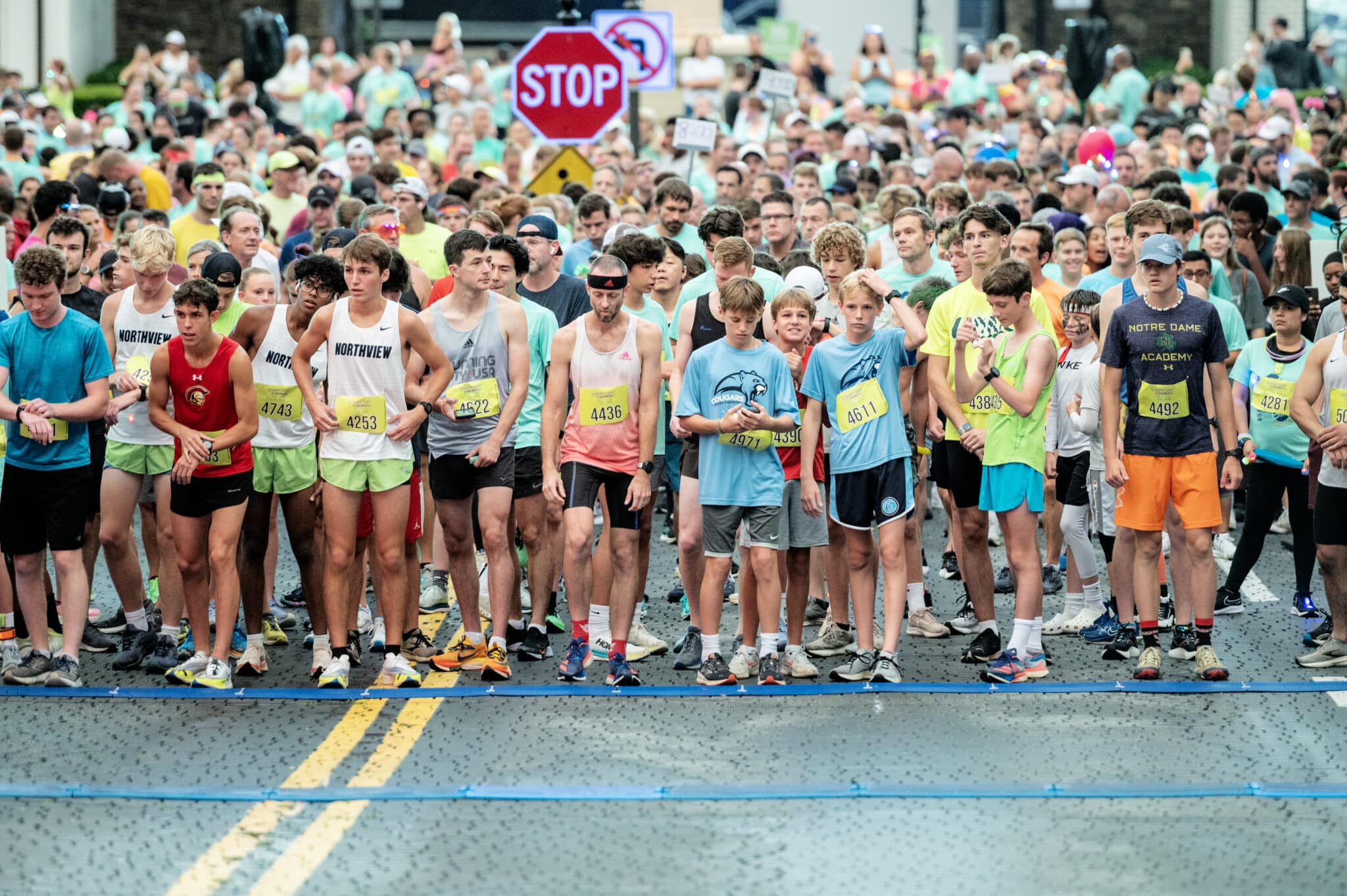
Peachtree Corners’ annual Light Up the Corners Twilight Trot and Glow Race is returning to the Forum on Aug. 10 for its 13th year of building community, getting some exercise and benefitting a very worthy cause.
Amy Massey, the founder of Light Up the Corners, said her inspiration for the nonprofit came from serving on the board of the Fowler YMCA for 10 years.
“I was always looking for ways to raise money for [Fowler YMCA’s] annual campaign. And I rotated off about 12 years ago or 13 years ago. At that time, I was looking for ways to raise money, and the City of Peachtree Corners was talking about becoming a city through UPCCA,” she explained.
“I’m a runner and I was a member of the Y, and we had a running group out of the Y. So, I just recruited some of my running friends and decided we would start a race in Peachtree Corners,” Massey added.
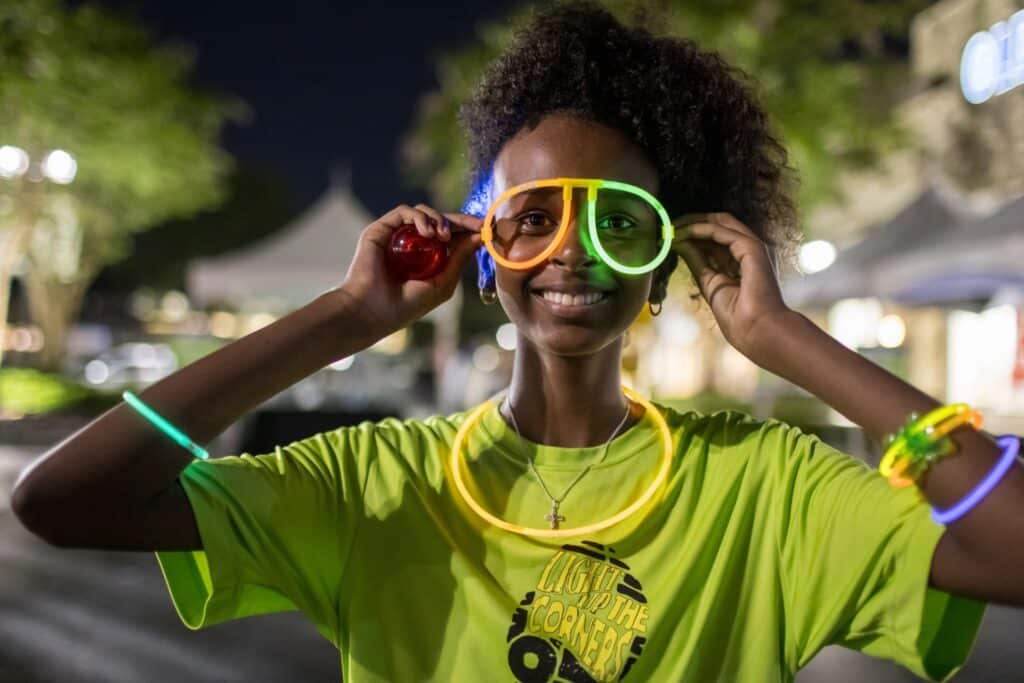
Bigger and better
In its first year, the race had roughly 400 participants. Not a bad turnout for the inaugural event, but Massey and her team of volunteers quickly started brainstorming on how to attract more runners.
“We talked about doing a glow run, and that’s when it changed. So, in year two, we did our first glow run. This year will be our 11th annual glow run and our 12th run altogether. And then we took one year off during COVID,” said Massey.
It’s my baby,” she added. “But I could not do it without the help of my friends and running partners who have been with me all the way. We have some of the same volunteers on our committee now as we did when we started out.”
This year, Light Up the Corners expects over 1,500 attendees.
“There are a lot of glow runs out there that are more of adult-focused parties. But ours truly is a coming together of people of all ages and all walks of life,” said Massey.
“That’s what sets us apart because our largest demographic in terms of age groups is the 10 to 19 range. A lot of school-age kids come out, a lot of young kids with their parents. We have 300 little kids who sign up for the Twilight Trot, which is just half a mile long. And so that attracts the little ones. It’s heartwarming to see people of all ages come together and it’s a healthy fitness-focused, family-friendly community activity,” she added.
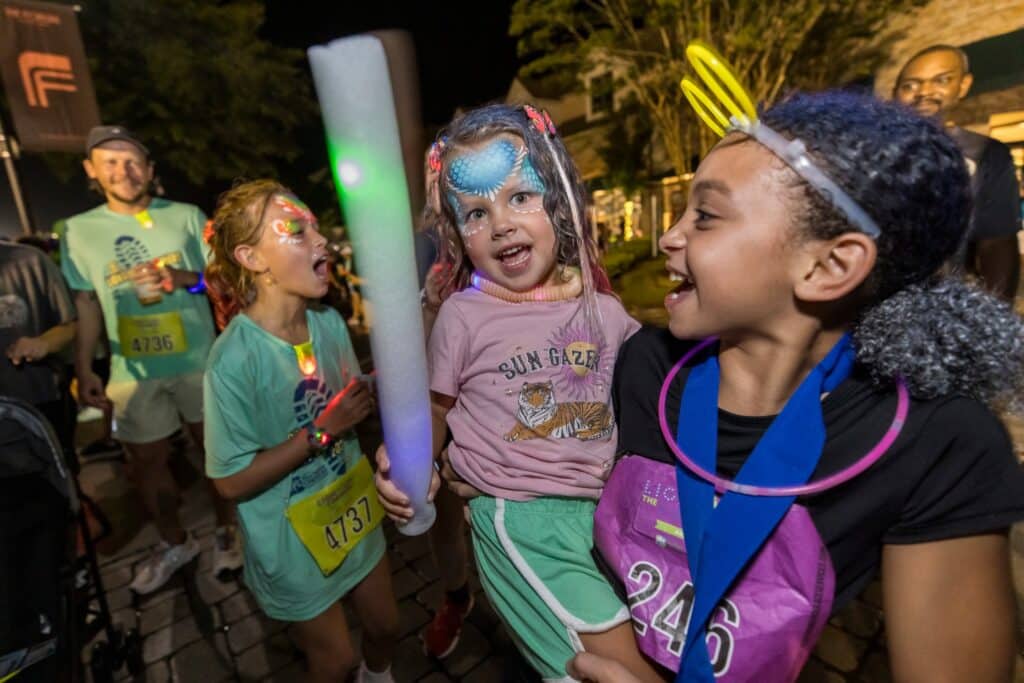
A big, family-friendly party
In addition to two races: a Twilight Trot 1K for the kids, and a 4-mile Glow Race for the adults, the Forum will be showcasing its new plazas. The pre-party and Glow after party will be held on the Grand Plaza which is set to open on that very weekend.
“Each participant gets a lot of glow swag, we want to make sure everybody lights up the course as they’re running around Peachtree Corners, and also to keep them safe so everyone gets that and a glow baton,” explained Massey.
“We welcome runners, walkers and people of all ages. It is more about the fun and the excitement of coming together as a community than it is about racing or setting any speed records,” she added.
The Forum has also hired Yvonne Monet, a radio personality and DJ with Q99.7, to entertain eventgoers and keep the energy up with great music. There will also be face painting and neon fingernail painting, along with roaming entertainers on roller skates and more, courtesy of the Forum.
On top of that, race sponsors will be providing food and samples throughout the night, like pizza, watermelon and a wide variety of other tastings from The Forum restaurants.
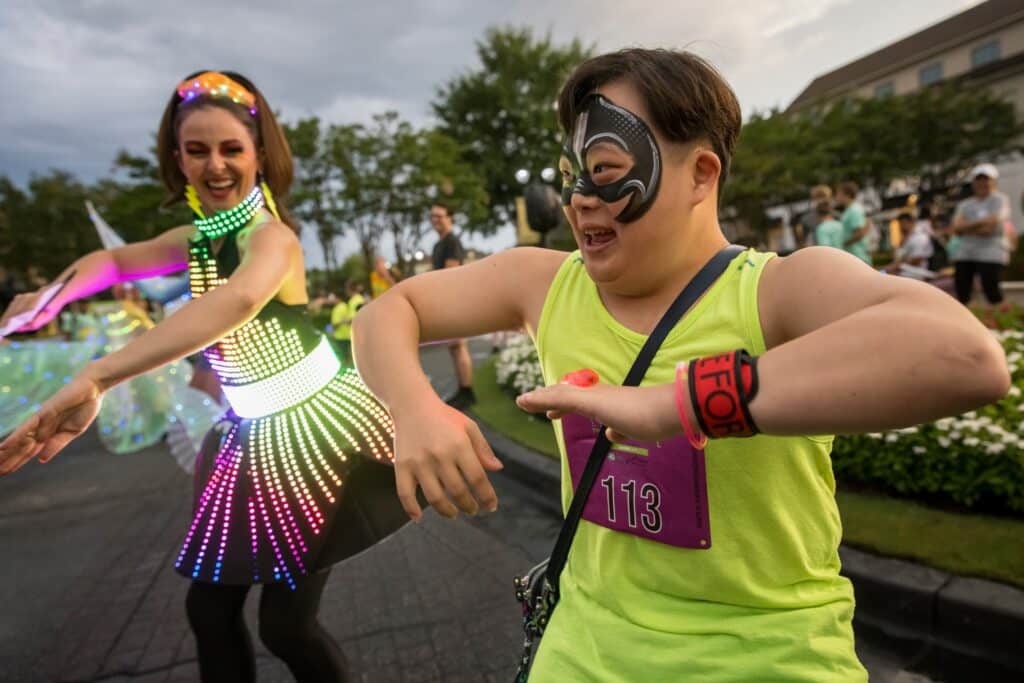
Coming together for a worthwhile cause
Light Up the Corners is an IRS-recognized 501(c)(3) nonprofit run entirely by volunteers. There are no paid positions at all, and 100% of proceeds go to the Why it Matters Campaign at the Fowler Y.
“All money stays local, and it is a passion of our committee to help the Y through this campaign. We believe that all people, regardless of their ability to pay, deserve to benefit from the programs and services at the YMCA. And they have a sliding scale that they use to provide financial assistance to people,” said Massey.
“There’s a wide range of programs and services, and I’ve seen firsthand the work that they do there and the life-changing effects that it has had on so many people in our community,” she added.
Sponsors are also fundamental to the event’s success.
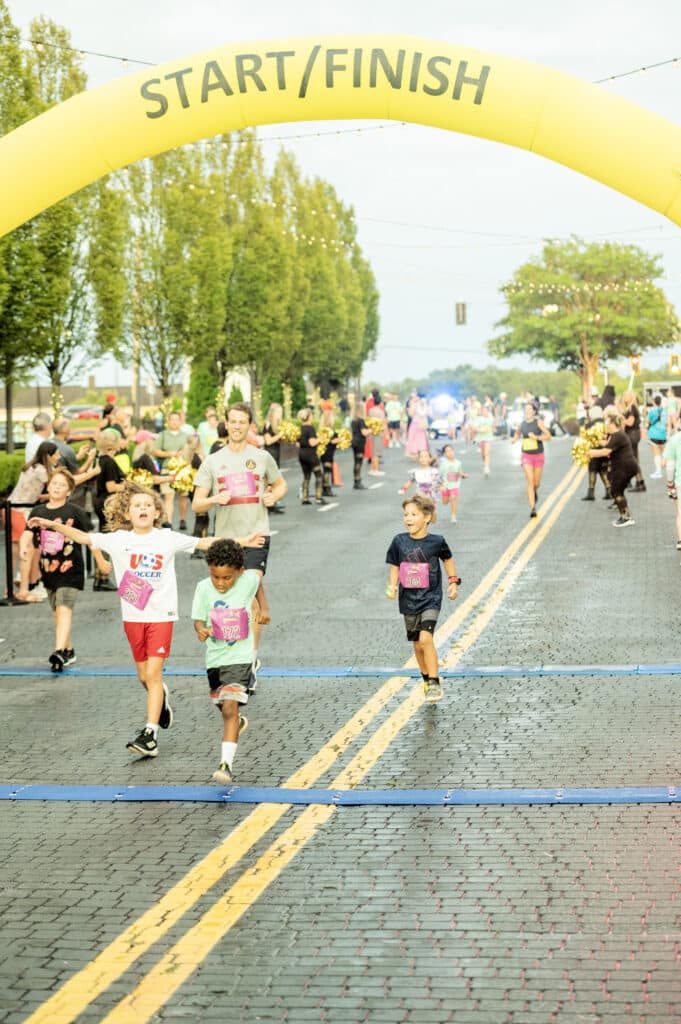
Without the support of sponsorships and generous donations, there would likely not even be a race because the associated costs would cancel out the registration fees, explained Massey. Sponsors allow Light Up the Corners to offset all costs of the event so that 100% of registration fees by individuals go directly to the YMCA.
“I will say that North American Properties, when acquired The Forum, have gotten behind this event 110%. They have been amazing in their support and generosity in providing the tents, the entertainment and the backbreaking work of setting up something like this,” said Massey. “We couldn’t do it without them or the City of Peachtree Corners which has been a title sponsor since day one.”
Fun fact: For the first time, Light Up the Corners held an open competition to see who in the community could design the best t-shirt logo for this year’s race. Daniel Lee was chosen out of over 30 submissions and was awarded $1,000 for his efforts.
To participate in the annual Light Up the Corners Glow Run, register at lightupthecorners.com or simply line up on the racecourse and cheer the runners on as a spectator. To become one of over 200 volunteers, email Amy Massey at amassey@runthecorners.com.
Related
Community
Twin Authors Chronicle Antics of ‘Four-Legged Brother’
Published
2 months agoon
June 6, 2024
Berkeley Lake second graders make fans across the globe with sweet children’s story.
When rescue dog Apollo found his forever home with Megan and Mackenzie Grant, the Berkeley Lake twins knew they had added a special member to the family. He’s so beloved that he’s considered their “four-legged brother.”
Apollo is a Boston terrier. The breed is known for its friendliness and love of people and children. According to the Purina Company, makers of all kinds of pet food, Boston terriers make affectionate pets and are outgoing and social.
While they are called ‘terriers,’ they are not in the terrier group, nor do they behave like them. They are far happier at home with their owner than getting into the usual mischief.
But Megan and Mackenzie see him as a silly addition to the family.
“He’s super cool because he’s always up for fun and loves us a whole bunch. And guess what? We love him back even more! He’s like the best friend ever, wagging his tail and making everything awesome!” they said in a press release.
Apollo’s birthday inspiration
As his first birthday approached, the girls, six years old at the time, wanted his day to be special.
“I said, ‘Well if you want to come up with something to do, let’s write it out,’” said mom Tameka Womack. “So they started writing out all these different adventures, and it was so cute.”
Megan recalled that their teacher had told them about someone who had published a book, and she asked if they could, too.
“When I read through it, they had all the different things, like playing dress up because we had bought some clothes for him. And we take them out for long walks around the lake and stuff,” Womack added.
Although their favorite subjects in school are PE and art, they did such a good job with the tale that Tameka worked with them to get it published. On Feb. 1, the young authors released the children’s book, “How We Love Our Four-Legged Brother.”
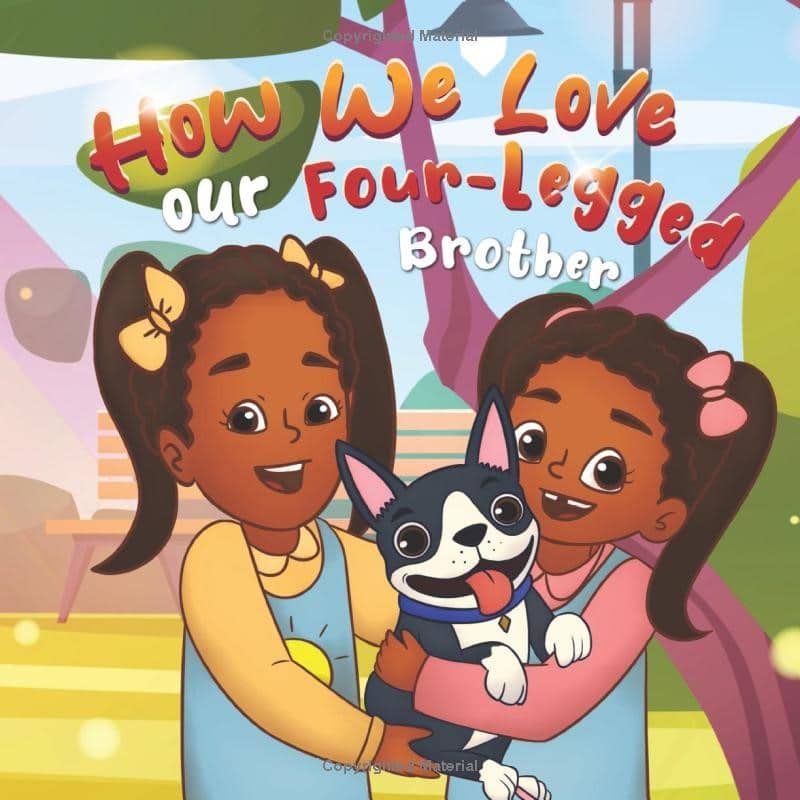
Publishing success
The 30-page book took off almost immediately. Available for print and digital through Amazon and print editions through Barnes & Noble, the book has reached customers in the U.K., Germany, France, Japan, Canada, Australia, Sweden, the Netherlands, Italy, Poland and throughout the U.S.
The girls and their mom were so pleased and surprised to find out the book was No. 1 in its category on Amazon.
“They were just so excited that people actually bought the book,” said Womack. “They were just like, ‘Wow, who is buying this?’”
Feedback from fellow twins, animal lovers and teachers showed that the story resonated on many levels.
“As an educator, I am always on the lookout for diverse and inclusive literature for my students. ‘How We Love Our Four-Legged Brother’ not only captivated the imaginations of the children in my class but also served as a wonderful conversation starter about friendship, empathy and the beauty of diversity,” wrote Ashleigh Darby.
The royalties from book sales are tucked away, with a percentage going to Apollo’s wardrobe.
“He won’t go out in the rain without his raincoat … or out in the winter without his sweater,” said Womack. “We have a little budget for his clothes because every time the girls see something, they’re like, ‘Oh, I think Apollo will like it.’ I’m like, I think he would too, but let’s let it stay in the store.”
Nurturing creativity
Although both mom and dad are engineers and kind of hoped that the twins would follow in their footsteps, Womack said she’s okay with them being artistic and creative.
“Writing is teaching them some responsibility and teaching them a little bit about money,” she said. “Now they want to write a book every day.”
Between raising three daughters (the twins have an older teenage sister), running a household with her husband and keeping up with her career at Georgia Tech, Womack said she’ll look for time to continue helping the girls with their dreams.
“With summer coming up, I would definitely encourage parents to help their children explore their creativity in any kind of way, from digging holes in the ground to … seeing the world … to creating books instead of being on the internet,” said Womack. I try to limit my kids’ screen time … and build real memories.”
Find “How We Love Our Four-Legged Brother” on Amazon.
Related
Community
Local State Reps Give Roundup of Legislative Session
Published
2 months agoon
May 28, 2024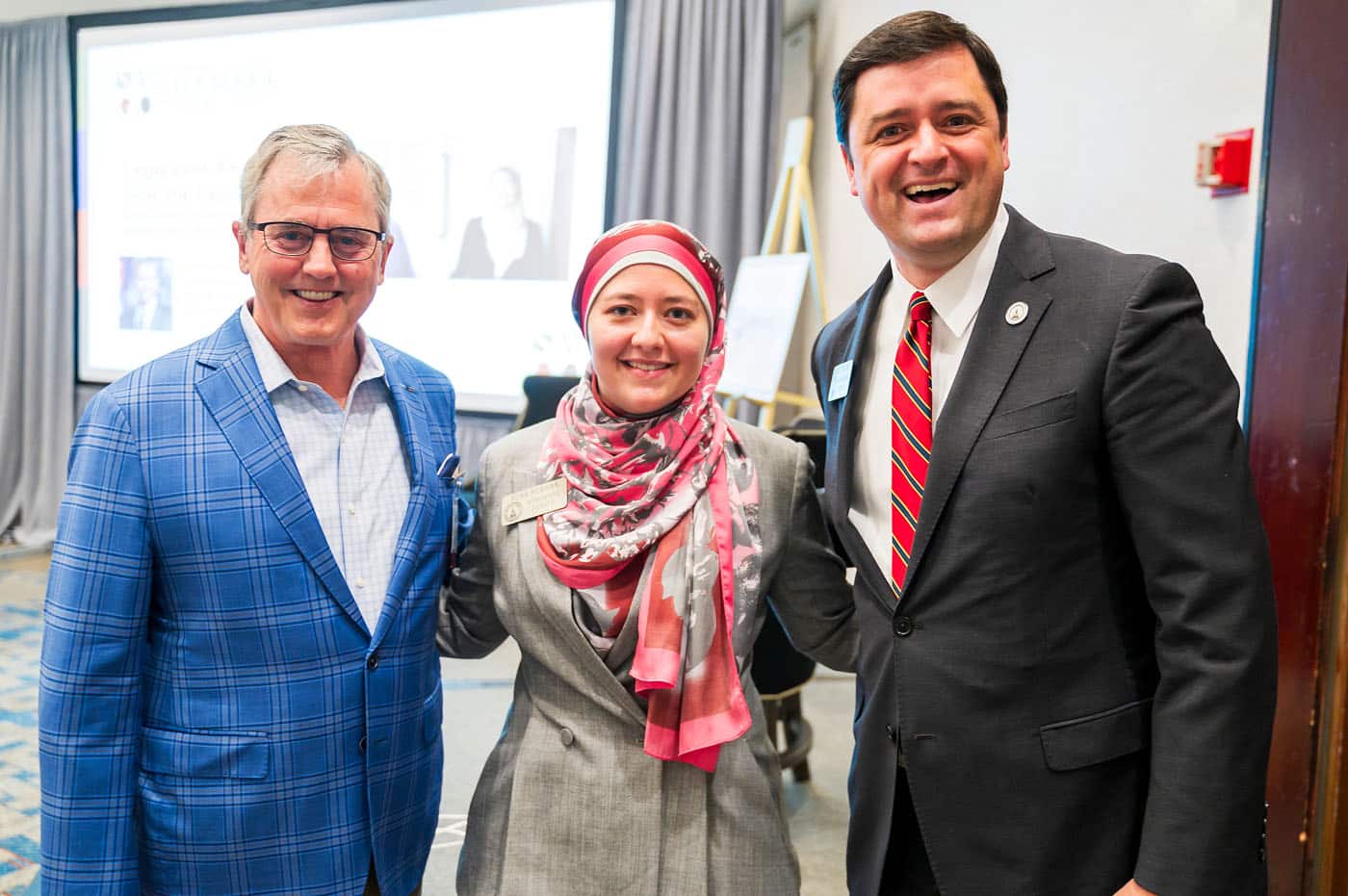
Hilton, Romman trade friendly banter that reflects diverse views in Georgia government
Georgia State House District 97 Representative Ruwa Romman and District 48 Representative Scott Hilton, whose constituents include parts of Southwest Gwinnett County, including Peachtree Corners, sat down for a second time to share information about legislative action at the State Capital.
Their discussion was part of the Southwest Gwinnett Chamber of Commerce First Friday Breakfast series at Atlanta Hilton Northeast.
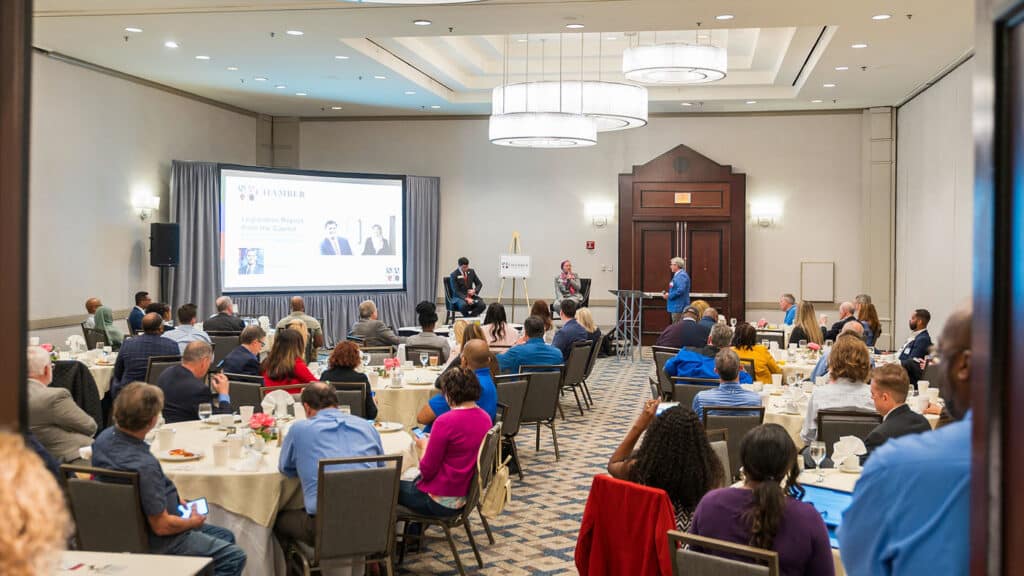
Although they sit on opposite sides of the aisle, Hilton and Romman both seek to sponsor and pass legislation that improves and maintains a high quality of life in the Peach State and provides its residents with what they need.
Elected in 2022, this was Romman’s sophomore year in the State House. She serves on the Georgia House Energy, Utilities and Telecommunications Committee, Georgia House Information and Audits Committee and Georgia House Interstate Cooperation Committee.
Hilton previously served in the State House from 2017 to 2019 but took a “sabbatical,” as he calls it, to serve as executive director for the Georgians First Commission under the Office of Governor Brian Kemp.
He was re-elected to his current position in 2022. He is the vice chair of the Georgia House Creative Arts and Entertainment Committee and the Georgia House Education Committee, as well as a member of the Georgia House Public Health Committee and the Committee on Georgia House Urban Affairs.
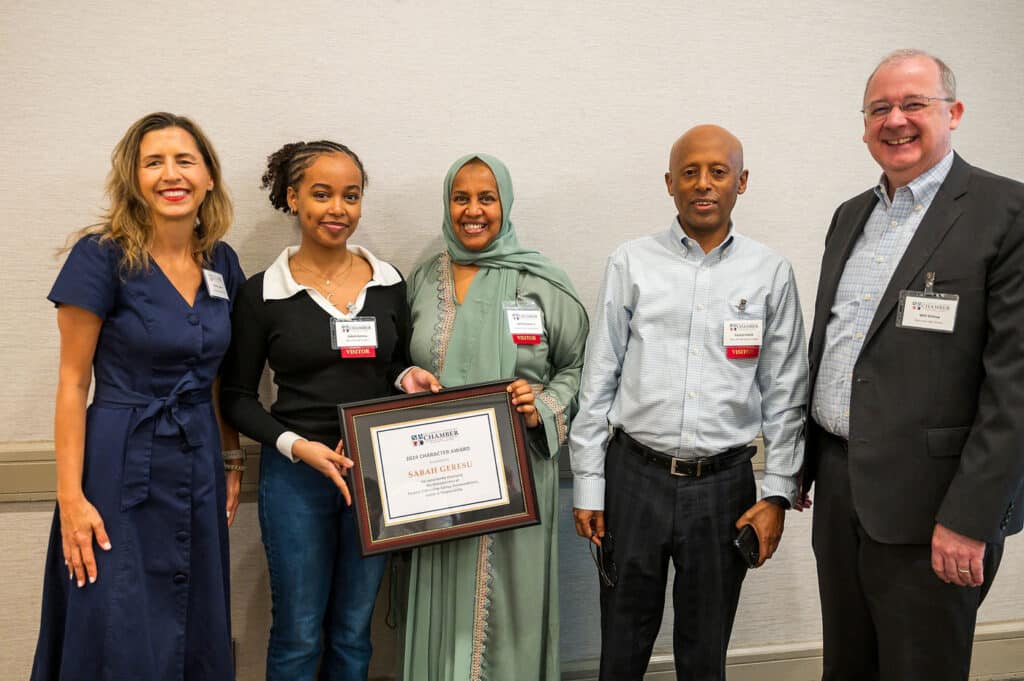
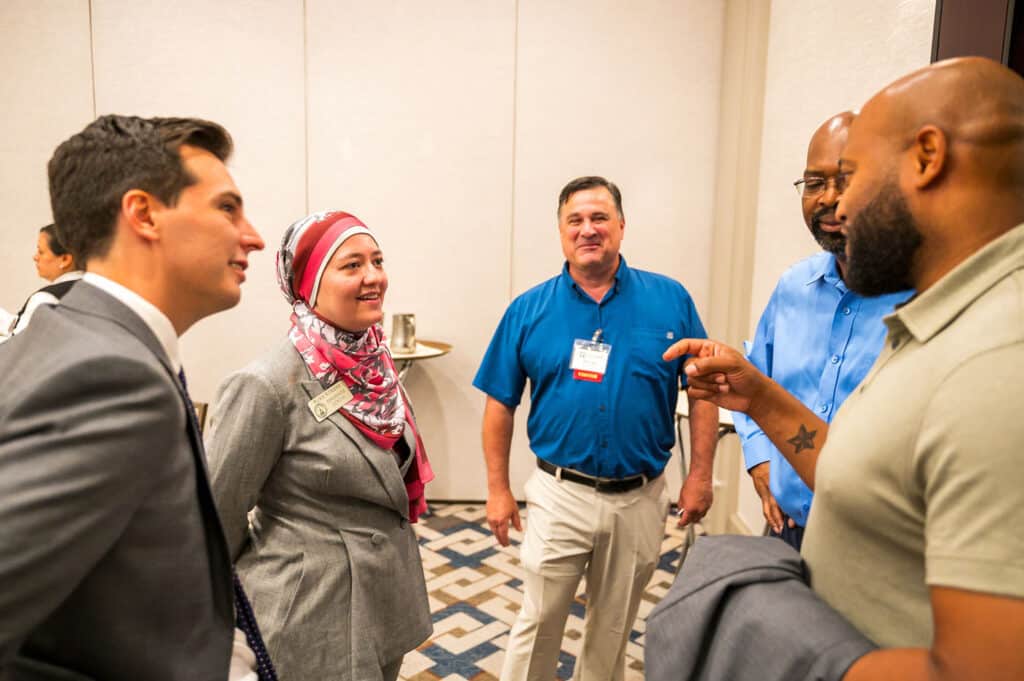
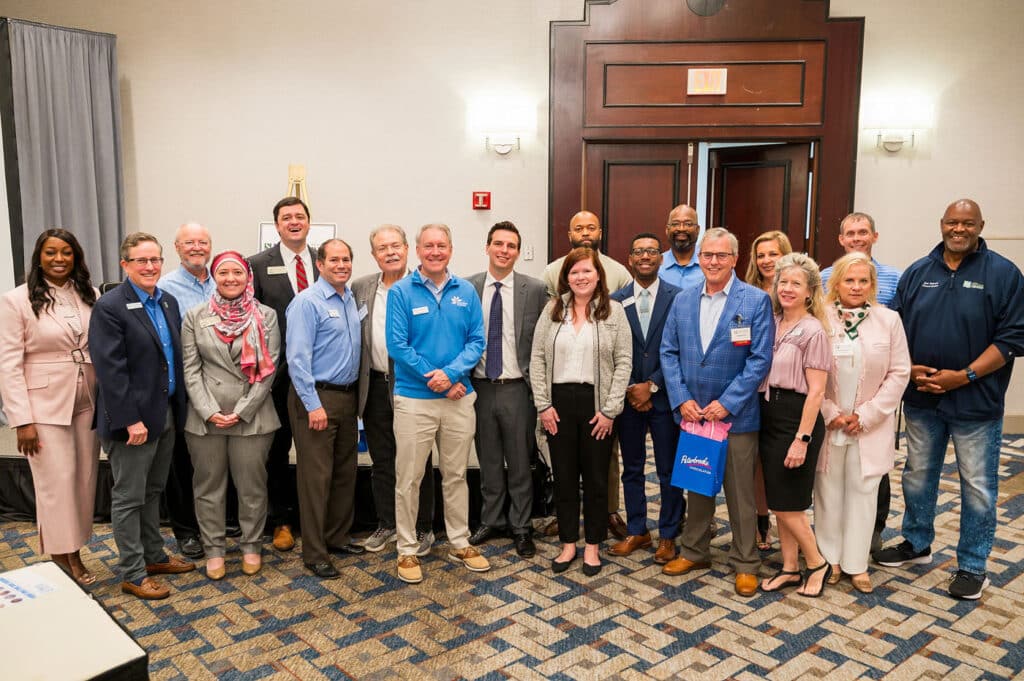
Senate Bill 63
The moderator, Norcross resident and former WAGA political reporter Dale Russell started off with a topic making headlines: Senate Bill 63. This law, signed by Gov. Kemp shortly after the session ended, prohibits charities, individuals or groups from providing bail funds for more than three people per year unless they register as bonding agencies. It also expands mandatory cash bail to 30 new offenses.
“I think it’s going to bring home safety to the community,” said Hilton. “I ran on that issue because as I was knocking on doors, I’ve heard from folks who [want to] keep our community safe. And unfortunately, no community has been immune from the uptick in crime that we had seen post-COVID, so this was one of those bills in response to that.”
Hilton gave examples of crimes where individuals out on bail committed acts such as murder.
“That was our commitment back to our constituents to say, ‘Listen, we’re not going to let bad guys back out onto the streets again to do more crime.’ This bill was in response to this; it’s going to keep our community safe, hold those accountable and bring justice to those who break the law,” Hilton remarked.
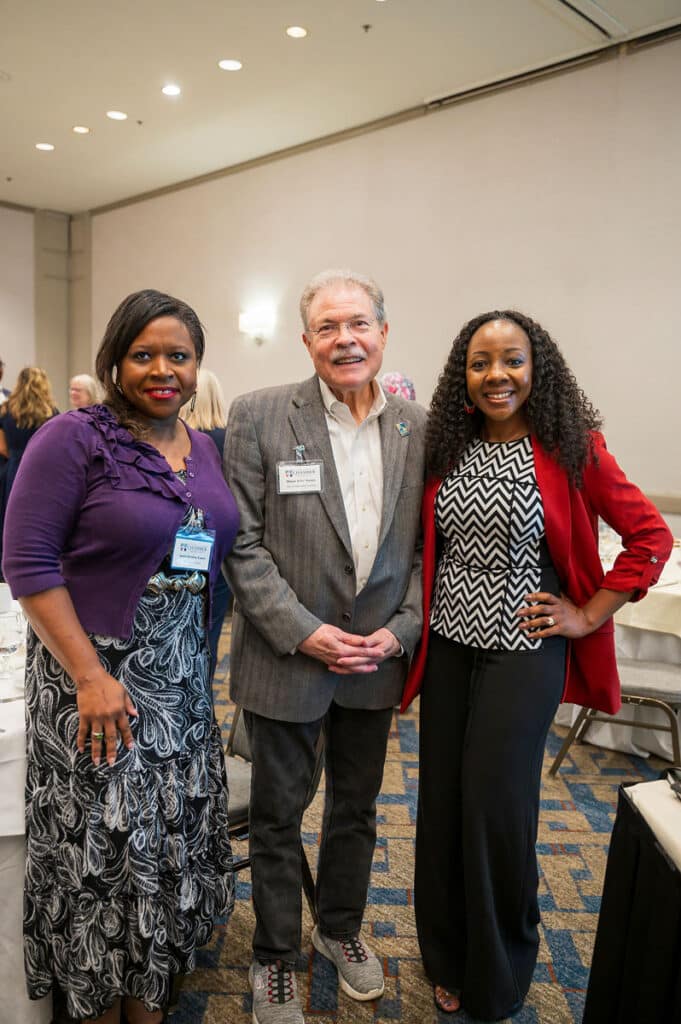
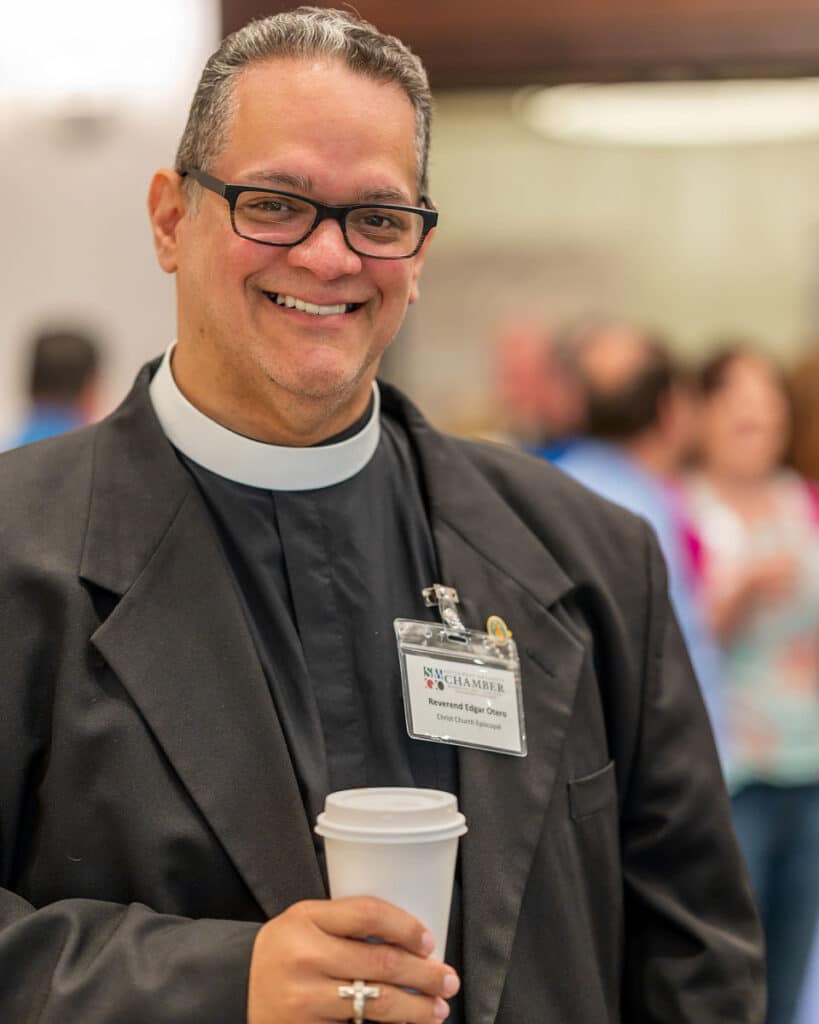
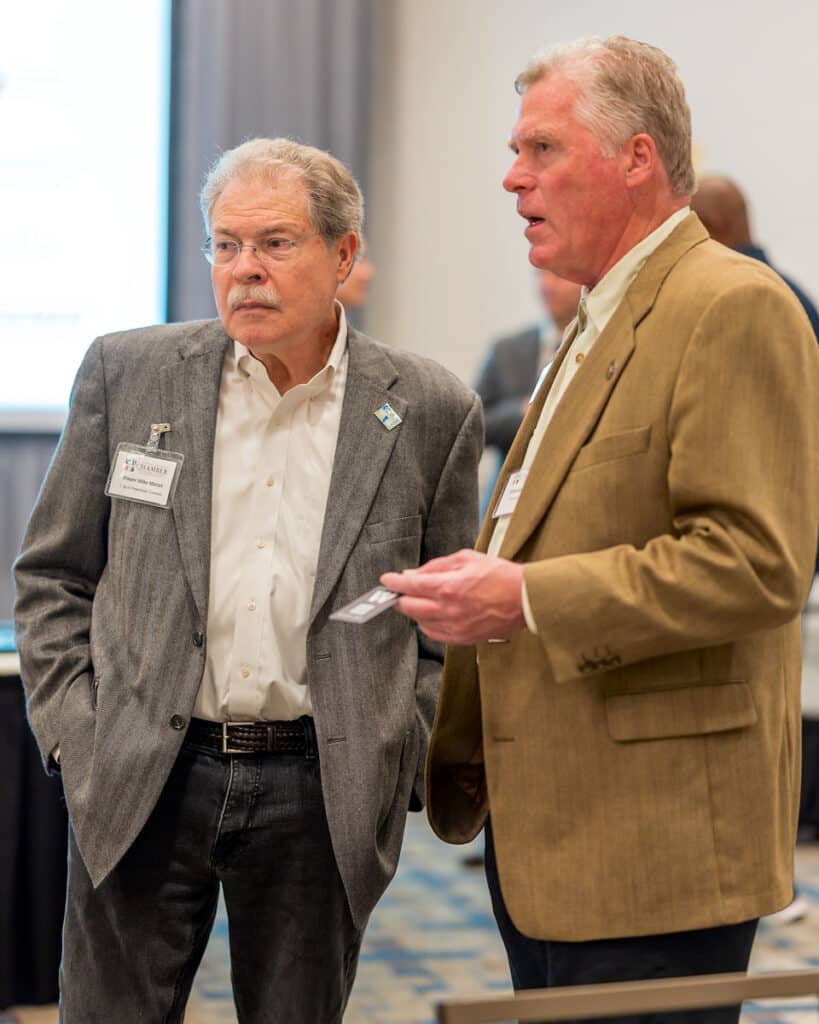
“Unfortunately, right now, we’ve got district attorneys and sheriffs across Georgia who are blatantly disregarding the law and letting folks back out on the streets who pose, you know, safety risks to law-abiding citizens like you and I and your businesses,” he continued.
Russel pointed out that there’s been a lot of criticism of this law.
“The ACLU was totally against it. Some felt like it was imprisoning poor people in the sense, for minor crimes,” he said.
“I do agree with the criticism for a few reasons,” said Romman.
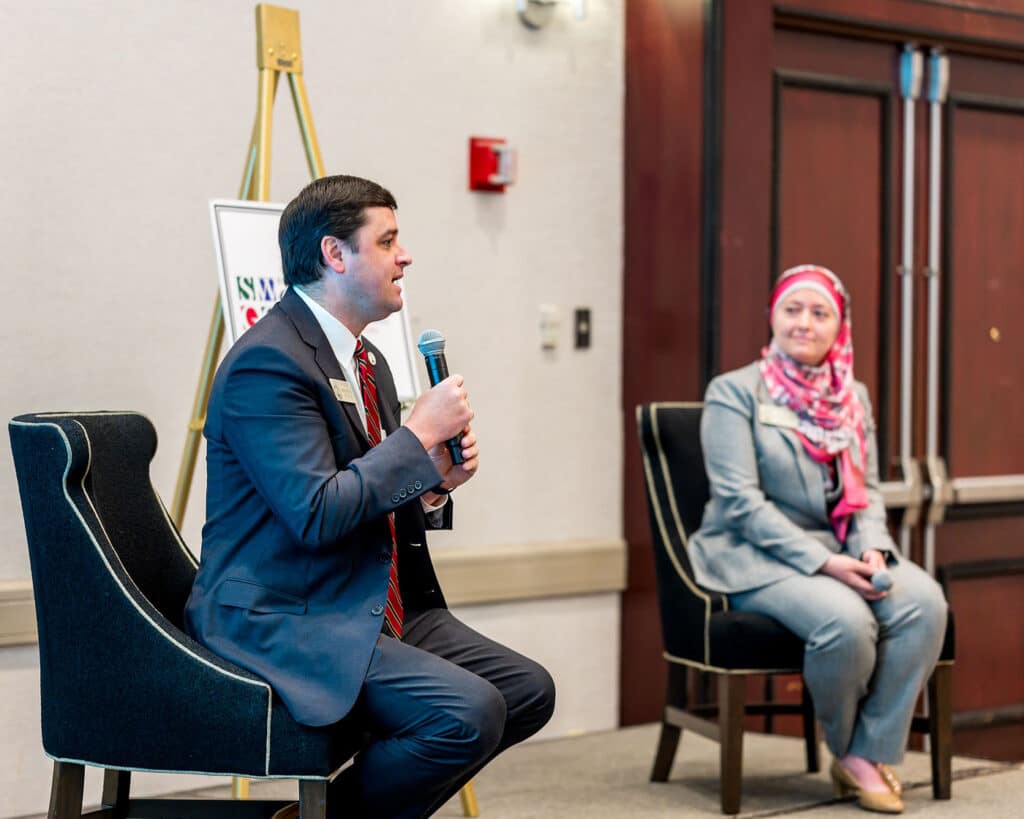
“The problem with this bill is that of the 30 crimes that are listed as now requiring a cash bail, the majority of them don’t actually require jail time, even if you’re found guilty of them. So now, somebody who would not even have ever served time for those crimes that are listed could now serve jail time because they cannot afford their bail,” she explained.
She added that the law doesn’t address the crimes it’s supposed to protect citizens from.
“We see these headlines, but this bill doesn’t address those because what we see happening is that a lot of churches now will no longer be able to bail people out that cannot afford their bail because of this bill,” she said.
“And churches that have been trying to, for example, reunite a parent with their children for Christmas, or whatever the case may be, can no longer do that. There is actually an exception written into this bill for bail bondsmen. So, it’s not like being able to pay cash bail is completely out of the question. It just means that somebody can make money off of it now,” Romman continued.
Hilton said the state isn’t done with addressing public safety issues as they come up.
“I know that’s been a priority of the governor, and I think rightfully so; you know, there’s a reason we’ve got citizens flocking to Georgia over the last ten years; we’ve added a million Georgians to our state, and they are leaving states with policies that don’t have this. They’re coming to Georgia for economic prosperity, for safety and for good schools,” said Hilton.
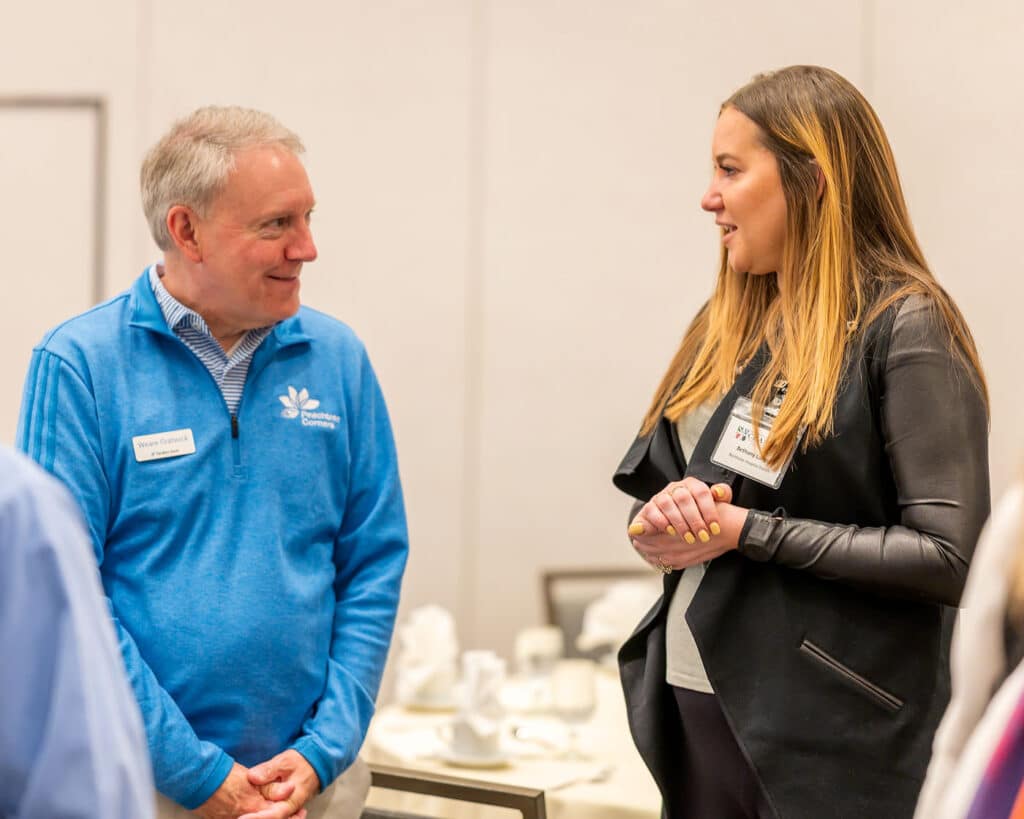
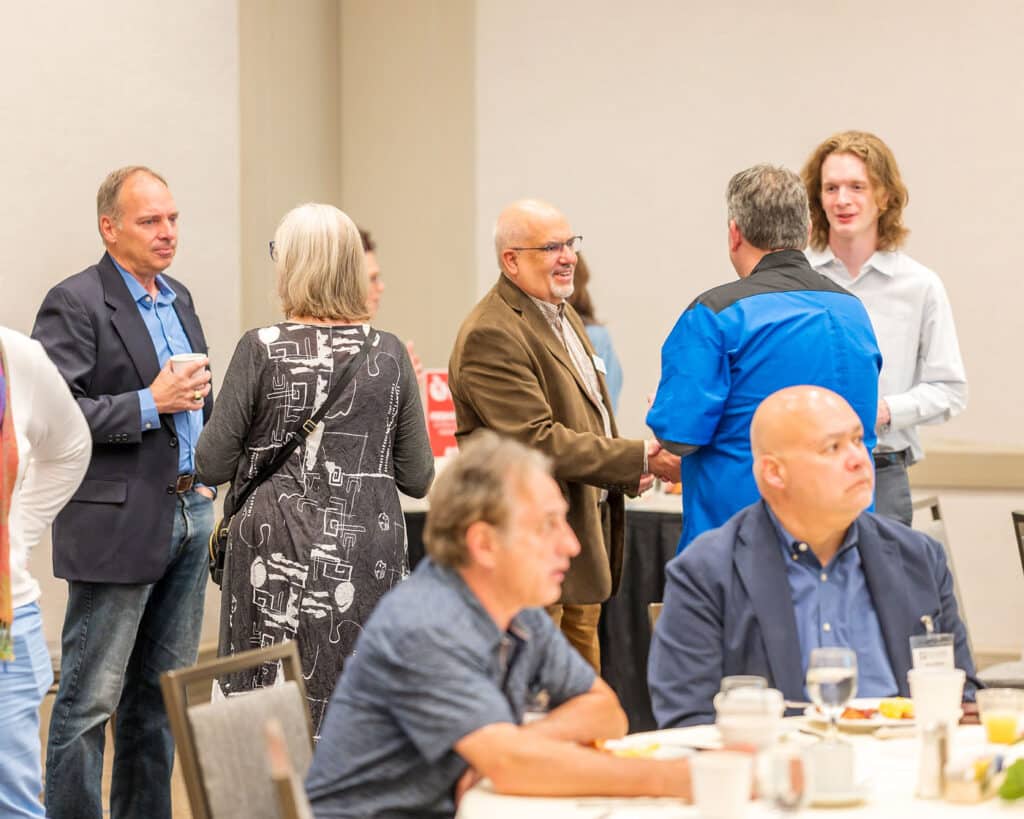
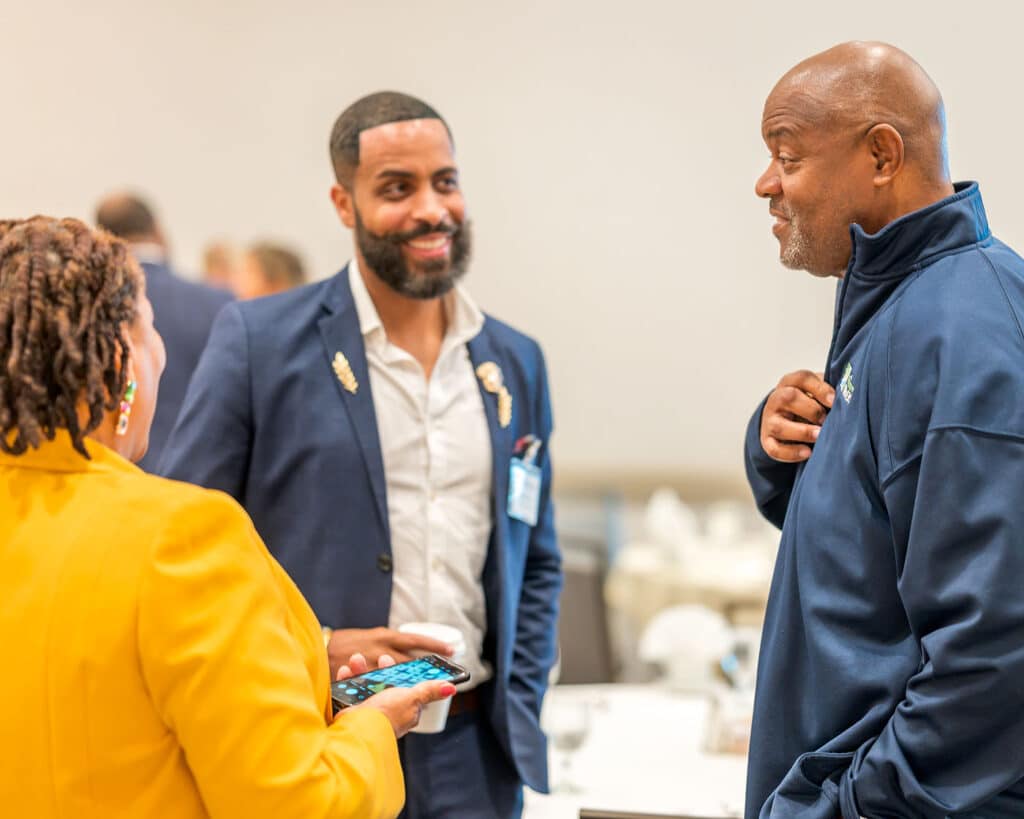
House Bill 1105
Another controversial bill, HB 1105, is framed as a public safety bill that requires local enforcement to coordinate with federal immigration officials when someone in custody is suspected of being in the country illegally.
Some say it’s an immigration bill.
“I know that the federal administration is trying to tell us there’s not a crisis. But there is a humanitarian crisis going on right now on our southern border. … But they’re not handling it the right way, and it’s starting to impact our communities,” said Hilton.
“We’ve got sheriffs who have folks in their custody, who [need] to be reported up to ICE. And essentially, they’re sort of ignoring what’s in the law right now that says you got to report these folks,” he explained.
Romman doesn’t see it that way.
“Again, when you read the contents of the bill, that is, unfortunately, not what it does,” she said. “I’m one of the few, if not the only, member of the legislature that’s done any border project work,” she remarked.
She talked about her work keeping unaccompanied immigrant minors safe.
“I want to remind people that when we talk about immigration, there’s an entire spectrum of people that we are talking about. And it’s not just at the border, it’s also people that fly into our country legally, that gets narrowed into a terrible immigration system,” Romman said.
“It forces our state and county and city police to do federal-level work without more funding. What we’re doing is we’re actually adding an increased burden, essentially onto their workload that we are not paying for. And in addition, within this bill, if they do not do this, they could lose more funding.”
She added that this will take the police away from focusing on local issues and trying to work with people who live in their communities.
“If a community member feels like if they reach out to police for help, and the police are going to deport them, they are less likely to report crimes and less likely to work with our local police department,” Romman said. “If we’re serious about immigration and its relationship to crime, immigrants are 30% less likely to commit crimes, and I don’t want to vilify an entire group of people.”
Romman said she supports a holistic, three-pronged approach that includes improving conditions on the border and pathways to citizenship.
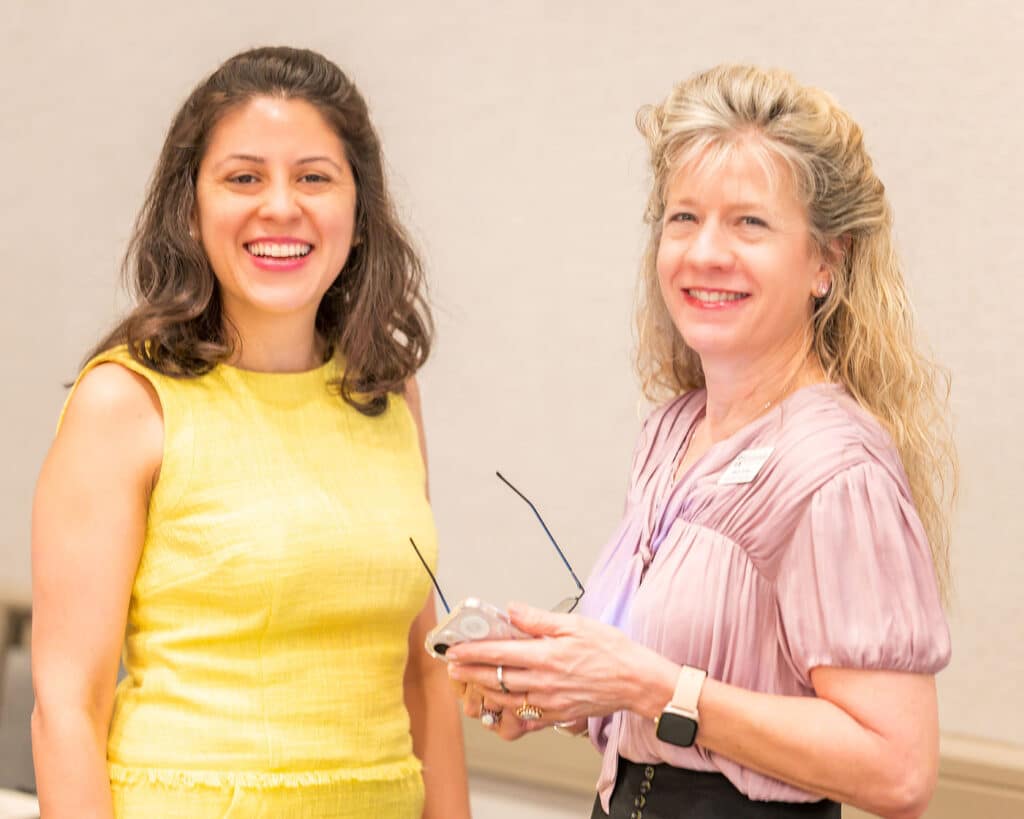
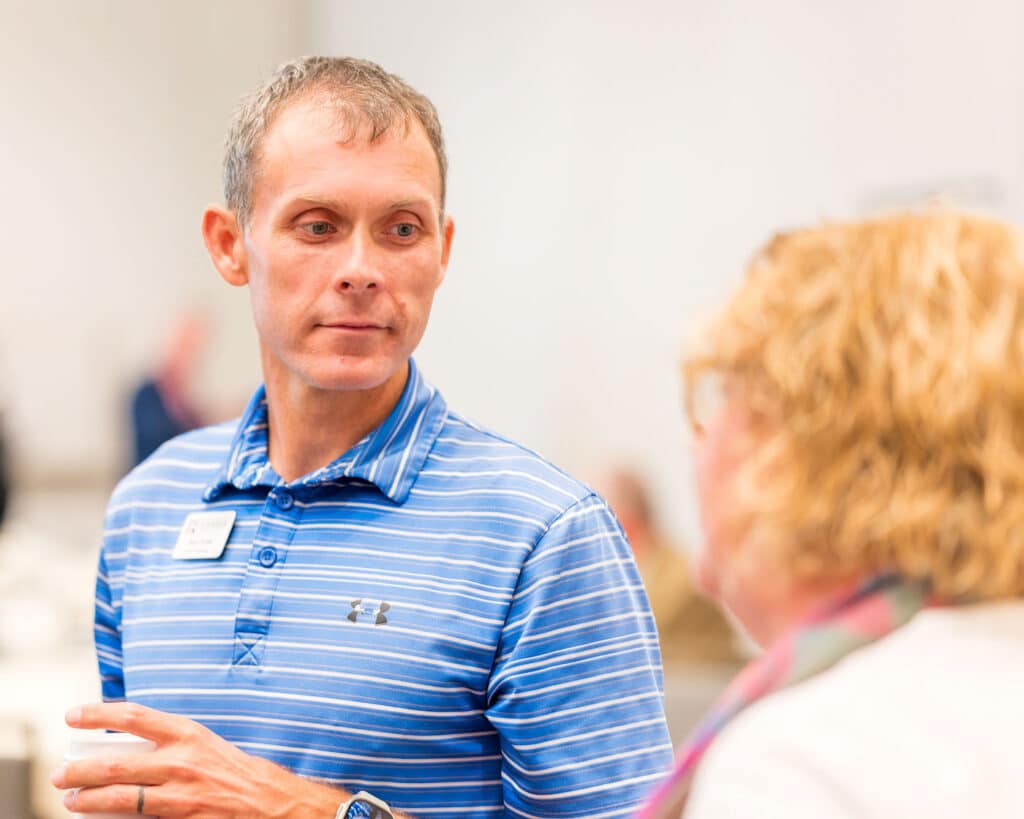
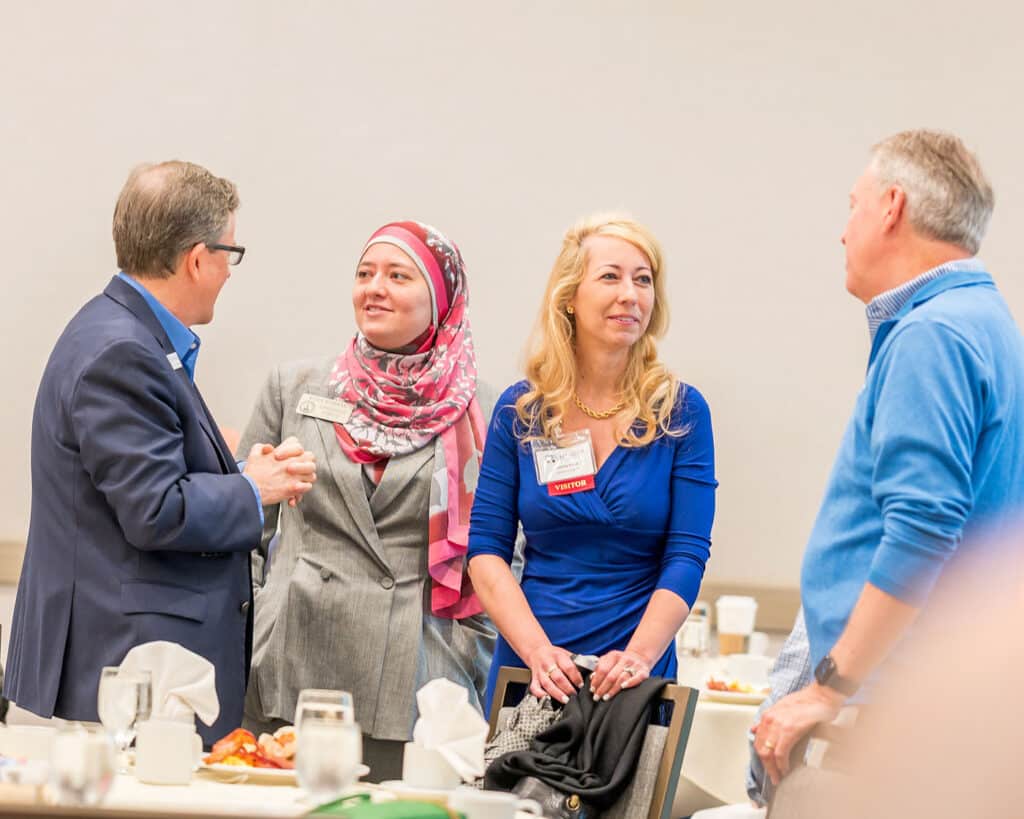
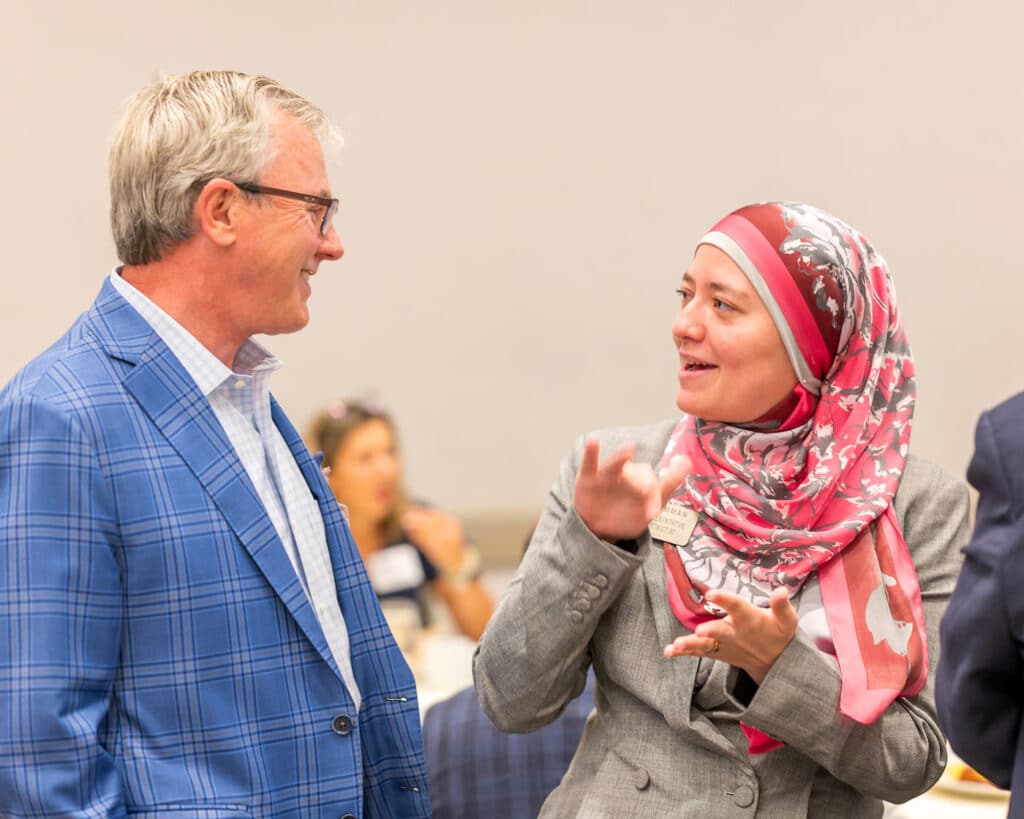
Business-related legislation
When the smoke cleared, both Hilton and Romman joked that they had different opinions about many issues but agreed that’s a healthy part of how the government works.
“The fact that we do disagree and the fact that you, the community, have varying choices and options out there. I think it’s a healthy part of the process,” said Hilton. “And we do have fun. I was telling somebody we play kickball about halfway through the session, and we do get along.”
The discussion moved on to topics such as the FTC ruling on non-compete clauses and tort reform, which just about everyone in the room agreed upon. Although employees could see the beauty of disallowing non-compete clauses, as business owners, they’d hate to see trade secrets put in jeopardy or valuable time and money put into training to benefit another company.
And everyone wanted to see caps on personal injury claims for things like slip-and-falls and fleet vehicle accidents.
“One of the few regrets I have coming out of session is that we didn’t do more on tort reform,” said Hilton. “Right now, Georgia is the number one judicial hellhole in the nation, meaning that we have more lawsuits on businesses and payouts than anywhere else in the country.”
This was one area where both representatives had similar views.
“I don’t think this is a left or right issue,” said Romman. “I want to make sure that whatever tort reform we pursue does not let, for example, a bad-acting company off the hook. But on the flip side, if somebody is just going around and suing everybody all the time to try and make some money off of it, how do you protect corporations and businesses from those kinds of bad incidents litigation?”
“What I will continue to look for when it comes to tort reform is, how are we going about balancing that?” she added.
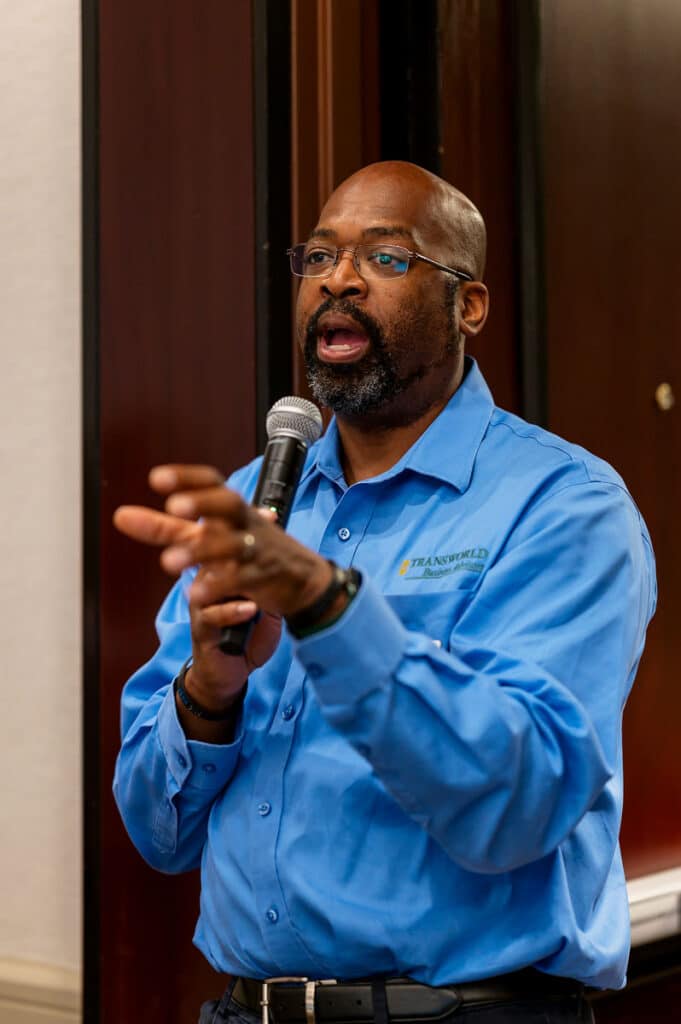
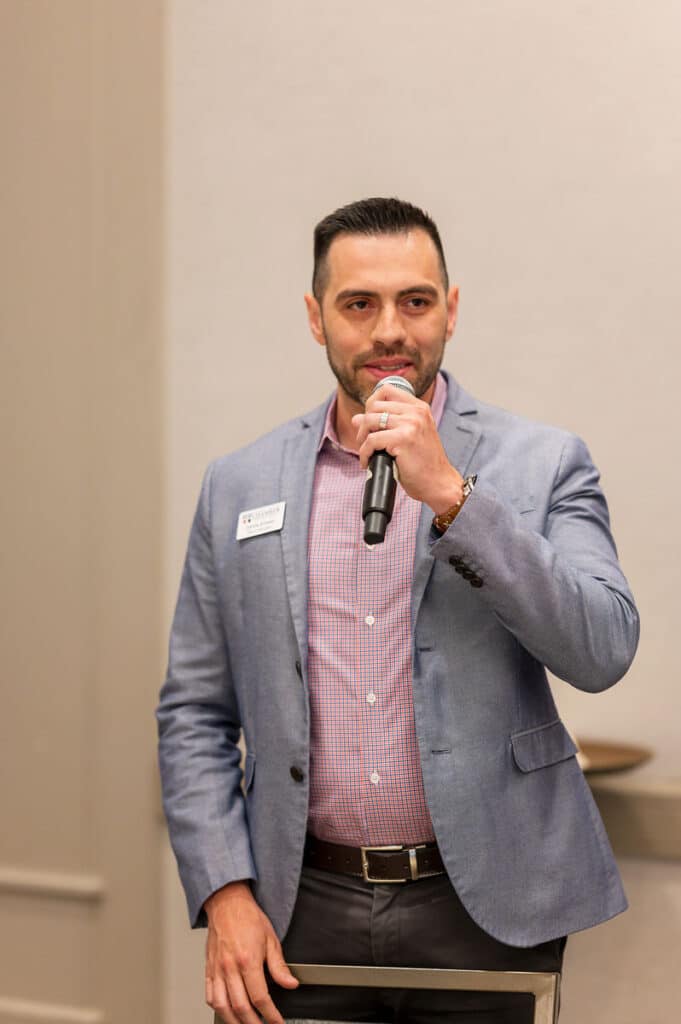
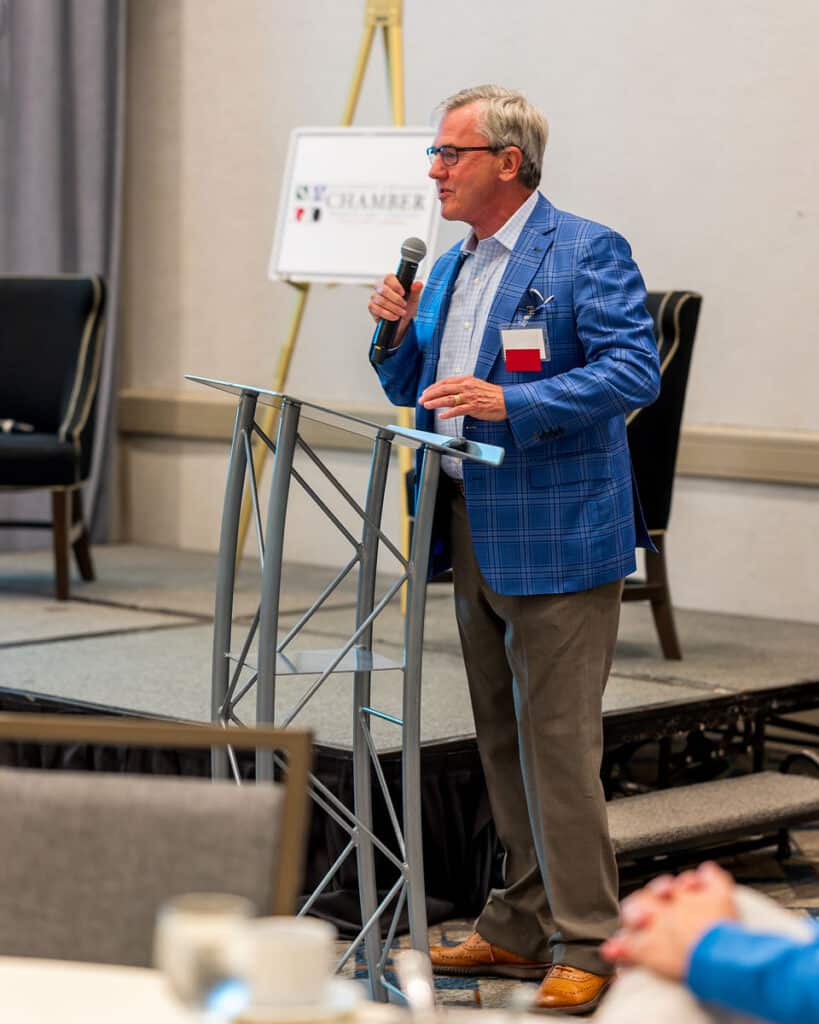
Looking ahead
As the session wrapped, Romman and Hilton pointed out legislation they’d like to see move forward next year.
“House Bill 971 creates a $300 tax credit for taxpayers who sign up for firearm safety training or purchase a safe storage device. It’s a bipartisan measure, viewed by some as a small but perhaps significant move for gun safety advocates, which was tabled in the Senate room,” said Romman.
She said the bill wouldn’t even require someone to disclose that they owned a firearm, but it was meant to incentivize people to store their firearms properly.
“There wasn’t a lot of appetite if somebody didn’t properly store their gun to have consequences for that, so we thought it would just incentivize better behavior,” she said.
Hilton mentioned school safety.
“Over the last three years, every single school in Georgia has gotten a one-time $100,000 grant for School Safety. That’s every school in Georgia; in this most recent budget, we included $45,000 in recurring money for every school in the state to do whatever they want to ensure their campuses are safe,” he said. This includes private schools as well.
At the end of the event, Hilton and Romman reminded the audience that they weren’t running against each other, and even though their views were different, their goals for a better Georgia were equally as passionate.
Related
Read the Digital Edition
Subscribe
Keep Up With Peachtree Corners News
Join our mailing list to receive the latest news and updates from our team.
You have Successfully Subscribed!

The Forum Gives Sneak Peek of New Eateries and Community Spaces

What’s going on at Jones Bridge Park and the Challenges of Urban Development

Taste of Peachtree Corners: PCBA Showcases Local Restaurants

Southwest Gwinnett Mayors Share Visions for the Future

Peachtree Corners Shines Bright with Light Up the Corners Glow Race this August

8 Events Happening In and Around Peachtree Corners This August

Peachtree Corners Shines Bright with Light Up the Corners Glow Race this August

The Forum Gives Sneak Peek of New Eateries and Community Spaces

8 Events Happening In and Around Peachtree Corners This August

Southwest Gwinnett Mayors Share Visions for the Future

Taste of Peachtree Corners: PCBA Showcases Local Restaurants

What’s going on at Jones Bridge Park and the Challenges of Urban Development

Local Resident Opens AtWork Location in Peachtree Corners

CHRIS 180 Expands its Services into Gwinnett County [Podcast]

Light up the Corners [Video]

Capitalist Sage: Business Leadership in Your Community [Podcast]

Cliff Bramble: A Culinary Adventure through Italy

Top 10 Brunch Places in Gwinnett County

A Hunger for Hospitality

THE CORNERS EPISODE 3 – BLAXICAN PART 1

Top 10 Indoor Things To Do This Winter

The ED Hour: What it takes to Remove Barriers from Education
Peachtree Corners Life
Topics and Categories
Trending
-
Business3 days ago
The Forum Gives Sneak Peek of New Eateries and Community Spaces
-
Business1 week ago
Taste of Peachtree Corners: PCBA Showcases Local Restaurants
-
City Government5 days ago
Southwest Gwinnett Mayors Share Visions for the Future
-
Community3 days ago
Peachtree Corners Shines Bright with Light Up the Corners Glow Race this August






